
Title: Peter and Polly in Winter
Author: Rose Lucia
Release date: October 24, 2011 [eBook #37837]
Language: English
Credits: Produced by Juliet Sutherland, Matthew Wheaton and the
Online Distributed Proofreading Team at http://www.pgdp.net

BY ROSE LUCIA
Formerly Principal of the Primary School
Montpelier, Vermont
Author of "Peter and Polly in Spring," "Peter and Polly in
Summer," and "Peter and Polly in Autumn."

AMERICAN BOOK COMPANY
NEW YORK
CINCINNATI
CHICAGO
BOSTON
ATLANTA
Copyright, 1914, by
ROSE LUCIA.
Copyright, 1914, in Great Britain.
PETER AND POLLY IN WINTER.
E. P. 21
To
C. M. G.
Frontispiece MAP
CONTENTS
[5]

Peter Howe is a little boy. Polly is his sister. She is older than Peter.
They live in a white house. The house is on a hill. It is not in the city. It is in the country.[8]
There are no houses close about it. But there are trees and fields around it.
In summer these fields are green. In winter the snow covers them.
The fields and the hills are as white as the house. Then there is fun playing in the snow.
Peter likes to watch the snowflakes. He calls them "white butterflies." But he knows what they are.
His friend, the Story Lady, told him. They are just frozen clouds.
Peter said to her, "I think they are prettier than raindrops. They can sail about in the air, too. Raindrops cannot. I like winter better than summer."
"It will be winter soon, Peter," said the Story Lady. "But many things must happen first.
"The birds must fly away. The leaves must turn red and yellow. Then they will fall and you can rake them into heaps. We will go to the woods for nuts.
"All these things will happen before winter comes."
"Yes," said Peter. "And my grandmother must knit me some thick stockings.[9] And my father must buy me a winter coat. Grandmother must knit some stockings for Wag-wag, too."

"But Wag-wag is a dog, Peter. Dogs do not need stockings."
"My dog does," said Peter. "He needs a coat, too. His hair is short. It will not keep him warm. I shall ask father to buy him a coat."
"Do, Peter," said the Story Lady. "It is good to be kind to dogs. And when Wag-wag wears his coat and stockings, bring him to see me. I will take his picture."

It is fall. Summer is really over. But it is still warm. Jack Frost has not yet begun his work.
Peter and Polly have been watching the birds. For days they have seen great flocks of them. In the summer there were not so many together.
One day they saw several robins. These were flying from tree to tree.
Peter said, "I know they are having a party. They are playing tag."
"Perhaps they are," said his father. "Perhaps each bird is telling something to the bird he tags."
"What is he telling?" asked Peter.
"I think he is saying, 'Brother bird, don't you know that winter is coming? Soon the snow will be here. What shall we do then?
"'We cannot get food. We shall freeze.[11] Come, let us fly away to the South. It is warm there.'"

"What does brother bird say?" asked Peter.
"I think brother bird says, 'It is a long way to the South. It will take many days and nights to fly there.
"'Are our children's wings yet strong[12] enough? I do not like to go. But I know that we must.'"
"Doesn't he like to go, truly?" asked Peter.
"We do not know, Peter. The robins make their nests here. They lay their blue eggs here. They hatch their little birds here. They never do this in the South.
"Besides, they sing their beautiful songs here. They never sing them in the South. We like to think that they love the North better. But, of course, we do not know."
"How can they find their way back?" asked Polly.
"We do not know that, either, Polly. Many birds fly in the nighttime. Then they rest a part of the day."
"I couldn't find my way in the dark," said Polly.
"But the birds can," said father. "We do not know how. The winter home of some of our birds is thousands of miles from here."
"I like to watch the swallows," said Polly. "They sit in a line on a telephone wire. Then one flies to another wire. In a minute they all fly, too.[13]
"I think that they are talking about going away soon. I hope they will not get lost."
"Yes," said father. "They will soon be gone. But perhaps some of these very birds will come back here next summer."
"I wish we could know them," said Polly.
"We shall have a few birds left this winter," said father. "You know some of them. You know the chick-a-dees and the woodpeckers. And this winter I shall show you others."
"May we hunt for nests and eggs, father?" asked Peter.
"We may hunt, Peter, but we won't find any eggs in winter. We shall find other things. Perhaps we shall find the white-footed mouse. He sometimes makes his home in an old bird's nest."
"Can a mouse climb trees, father? If he lives in a bird's nest, does he lay bird's eggs?"
"He can climb trees, Peter. But he cannot lay eggs. We will see if we can find Mr. White-foot some day.
"But first we will watch the birds fly away and the snow come."
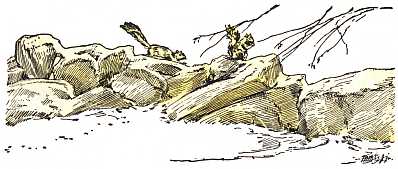
Around Peter's house is a beautiful field. This is Mr. Howe's hayfield. You can find it on the map in the front of this book.
The children like this field. All the year round, it is a pleasant place.
In the spring they find blue violets here. In the summer they watch the birds that make nests in the tall grass. In the winter they slide here on the crust.
At the farther side of the field, there are some trees. These are butternut trees. In front of the trees is a stone wall.
Peter and Polly like to play by this wall. Sometimes they play that it is a post office.
The holes in the wall are the boxes. There is a box for every one in the village. Peter has more than one box; so has Polly.[15]
The children take turns being the postmaster. If Peter is the postmaster, Polly calls for the mail.
The real post office is in their father's store. So they have often seen Mr. Howe put the mail into the boxes.
They use little sticks for the post cards. Leaves are the letters. Stones are the packages. Sometimes the boxes are full of mail—especially Peter's and Polly's.
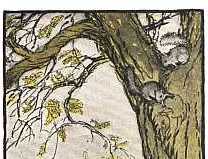

Often they play that it is Christmas time. Then the boxes are full of[16] packages. It is fun to guess what is in each package.
One day Peter said, "There is a knife in this package. I like it. There is a hammer in this package. I will build a house with it.
"There is a game in this package. Will you play it with me, Polly? And, O Polly! There is a pony in this package! That is what I wish for most of all."
"But, Peter, a pony is too big to be in your post-office box. It would not come by mail."
"Then Santa Claus will bring it," said Peter. "If I get it, I do not care how it comes."
One day the children saw that the butternuts were falling.
Polly said, "Let's pick up all we can. We will put them in our post-office boxes. When they are full, we will bring your cart. Then we can take the nuts home. We will crack them next winter."
So they filled the boxes with nuts. The nuts were still green. The children stained their hands with them.
While they were playing with the nuts, they saw two squirrels. These sat in the[17] trees above them. They watched Peter and Polly with their bright eyes, and scolded them a great deal.
"They want our nuts," said Polly. "But we have put them into our post-office boxes. We will keep them."
The next day the children went for their nuts. They took Peter's cart with them. What do you think they found?
Why, they found their boxes empty! The nuts were all gone!
"Some one bad has been here," said Peter.
Polly laughed. "You always say that, Peter. I think it was those squirrels. And I don't care, because they need the nuts to eat this winter."
"I don't care, either," said Peter. "I think we forgot to lock our boxes."
"Perhaps we did," said Polly. "But I guess the squirrels thought the boxes were theirs. When they called for their mail, they found the boxes full. How pleased they must have been! Let's pick up more nuts for them."
So the children again filled the post-office boxes with nuts. Then they went home and left them for the squirrels.

One day Peter saw something that pleased him. It was a branch of red leaves on a maple tree.
He said to mother, "It will be winter soon."
"Why do you think so, Peter?"
"I have seen red leaves," said Peter.
"But, Peter, a few red leaves do not count. There are red leaves in the summer. You must watch until you see many red, yellow, and brown leaves."
"What makes the leaves red and yellow, mother? Is it magic?" asked Peter. "Can you do it?"
"Perhaps it is a kind of magic, Peter. It is like the clouds turning into snow. I cannot do that."
Then Peter watched for all the trees to turn. At last they were bright with colors.[19]
The maples were red and yellow; the oaks a deep red. The beeches were a bright yellow.
Even the elm trees in front of the house were yellow. Now Polly liked more than ever to swing. The swing took her way up among the yellow leaves.
Then, one day, the leaves began to fall. Down they came, a few at a time. The next day more fell, and the next and the next.

Polly said, "They are prettier than the snowflakes. The snow is white. These have lovely colors. See them flying through the air."
At last most of the trees were bare. The leaves lay on the ground.
Then Peter said, "Oh, the poor trees![20] They haven't any clothes on. I am so sorry."
Polly said, "The leaves are not clothes. They are children. Now they have gone to bed. The snow is their blanket. When it comes, it will keep them warm. If we leave them alone, they will sleep all winter. I learned it in a poem."
"They cannot go to sleep yet," said Peter. "I shall not let them. I shall wake them up."
"How will you do that?" asked Polly.
"I shall run in them. That will keep them awake. I shall do it now. Come on! See if you can make as much noise as I can."
After a while the children raked the leaves into large heaps. Then they jumped in the heaps. This scattered the leaves. But the children did not care. They raked them up again.
Once Peter jumped where the leaves were not very deep. He came to the ground with a bang. He was surprised. But he was not much hurt.
He said to mother, "My teeth shut with a noise when I went down."[21]
Mother said, "It is lucky that your tongue was not in the way. You would have bitten it badly."
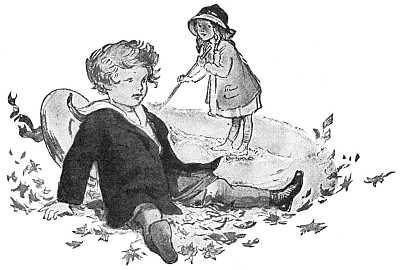
"Come in now, both of you. You must wash your hands and faces. Father will be home soon. You may play in the leaves to-morrow."
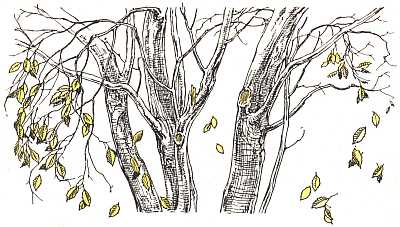 [23]
[23]
[1] Copyright, 1889, by Roberts Brothers.
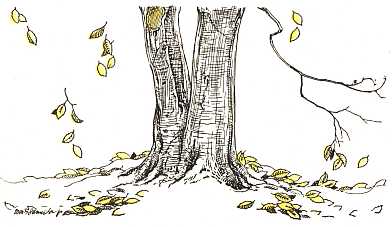

The next day father said, "Peter and Polly, will you work for me? I wish to buy your leaves. I will give you a cent for three loads."
"Oh, goody, goody!" said Polly.
"Oh, goody, goody!" said Peter.
"You must put the leaves in a pile in the garden. I will show you where."
"What will you do with them, father?" asked Polly.
"You will see to-night, if you are good workmen."
In the night the wind had blown the leaves about. So the children raked them up once more.
Then they filled the big basket full.[25] They packed in the leaves as hard as they could.
"That is to give good measure," said Polly. "Father always gives good measure at his store. So you and I must, too."
Every time they took a basketful to the garden, Polly made a mark on a piece of paper.
At last the yard was raked clean. They had taken to the garden twenty-nine loads. They had worked nearly all day.
At supper father said, "You are good workmen, chicks. Our yard looks very clean. It is ready for winter.
"You piled the leaves carefully in the garden, too. Now, how much do I owe you?"
"We took twenty-nine loads, father," said Polly. "I wish there had been one more to make thirty."
"Why do you wish that, Polly?"
"Because three goes in thirty better than in twenty-nine."
"Well," said father, "we will call it thirty loads, Polly. I saw you packing the leaves into the basket very hard.
"You are honest workmen to give me[26] such good measure. Now, Polly, three goes in thirty how many times?"
"Ten times, father. So you owe us ten cents. We shall each have five cents."
"Very good, Polly. Here is your money. I have a surprise for you. Put on your coats and come to the garden. Mother will come, too."
In the garden they found father beside the pile of leaves. He had thrown many things upon it.
He said, "I came home early and cleaned up the garden. Now, what shall we do with all this stuff?"
"Burn it, burn it!" shouted both children at once. "A bonfire, a bonfire!"
"Very well," said father. "You may burn it. Here is a match for you, Polly. And here is one for you, Peter. Light your fire."
Polly and Peter lighted the great heap. Soon the red flames were leaping up. They made the garden bright. Farther away from the fire it was very dark.
"Oh, see, see, mother!" cried Polly. "The flames are as pretty as the red and yellow leaves. Have they taken the color from the leaves? How hot they are!"[27]
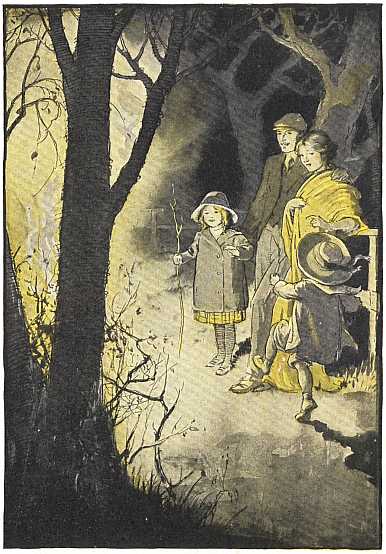
The children danced around the fire until it died down. Then mother took them into the house. It was bedtime.
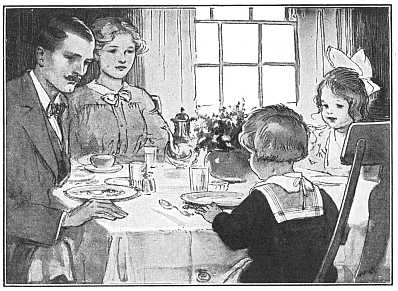
Peter is a nice little boy. But he can be very naughty. Mother and father know this. Grandmother Howe and Polly know it, too.
You see, Peter always wishes his own way. And you know this is not good for little boys and little girls.
Peter cannot have cake between his meals. He may always have milk to drink. Sometimes he may have bread and jelly, or bread and sugar.
He likes this very much. But he does not[29] like the crusts of the bread. So he used to eat only the soft part. The crusts he threw away.
But at the table he could not throw them away.
Then he put them under the edge of his plate. You know how.
When mother took the plate, there would be a crust on the table. It did not look very well.
One day father said, "Peter, you are a big boy now. You are nearly five years old. You are old enough to eat your crusts.
"I will give you a week in which to learn how. After that, I shall not expect to see any more crusts on the table."
Peter knew that, when his father spoke so, he meant what he said. But the little boy thought he would not eat his crusts until he had to do so.
He said to himself, "In a week I will begin to eat them all up. But now I will still put them under my plate."
So, every day when his plate was taken away, there were the crusts. Peter did not see his father look at them. And his father said nothing more about them.[30]
By and by Peter began to think that his father had forgotten.
So, when the week was over, he said to himself, "I am sure that my father has forgotten. I am going to keep on leaving my crusts."
But his father had not forgotten. He was just waiting to see if Peter would obey.
That noon he saw that Peter had left a crust.
He said, "My son, you have not learned to eat your crusts. And you have not learned to obey. I must teach you."
Then Peter was more naughty still. He said, "I do not like old crust. I will throw old crust away. Then I cannot eat it."
He picked up the crust and jumped down from his chair.
His father called, "Peter!"
But Peter did not stop. He ran to the door and threw the crust out upon the grass.
His father went after him. "You may pick up your crust, Peter," said he.
This time Peter started to obey. He knew that he had been very naughty. But, before he could get to the crust, an old hen[31] ran up. She snatched it in her bill and off she went.
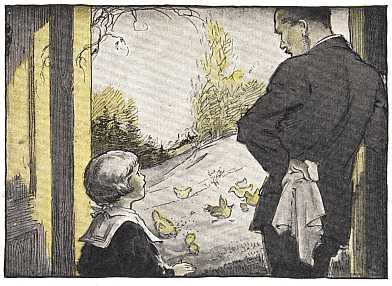
Peter looked at his father. He was not sure what his father would do. He almost wished the hen had not taken the crust.
Father only laughed. He said, "That old hen is a friend of yours, Peter. If it had not been for her, you would have eaten that crust."
"I know it," said Peter. "And, father, I am sorry. I do not like to be naughty. I will be good. I will eat my crusts now to please you."
And after this he did.

One morning mother said, "Polly, will you go to the store for me? I need a can of corn. We must have it for dinner."
"May Peter go, too, mother?"
"Oh, yes, Peter may go, if he wishes. Run and find him."
Now Polly and Peter liked to go to the store. It belonged to their father. Sometimes they helped him unpack goods. Sometimes they sat still and watched the customers.
Sometimes he let them play keeping store. Once Polly had really sold some candy to another little girl.
But to-day they could not stay to play. They must get the can of corn for mother, and come home.[33]
They went down the hill. At the railroad tracks they stopped. They looked for a train. They saw none, so they ran across the tracks.
Then they came to the bridge. You can find it on the map in the front of this book.
They stopped to look over the rail at the water, far below.
"O Polly!" said Peter. "What is on the water?"
"Why, it is ice, Peter. The top of the water is frozen. See, the ice goes nearly across the river."
"Ice, ice!" shouted Peter. "Now winter is almost here. The leaves have gone. The ice has come. Let's run and tell father."
The children ran to the store.
"Father, father," called Peter, "we have seen ice!"
"So have I," said father. "Where did you see it?"
"We saw it from the bridge. The river is frozen at the sides. It is not frozen in the middle."
"Yes," said father. "It freezes first at the edges, because the water flows more slowly there. In the middle it flows faster.[34]
"Every cold night that ice will grow. It will soon cover the middle of the river, too. And at the same time it will grow thicker."
"By and by it will be so thick that we can walk upon it. Then it is time to learn to skate. Perhaps you can learn this winter."
"When the ice is thick enough, men cut it into blocks. What will they do with them?"
"Make houses of them," said Peter.
"O Peter, we are not Eskimos," said Polly. "I know, father. They will put the ice into big ice houses. They will keep it to use in the hot summer. I saw them doing it last winter."
"Right, Polly. That is where our ice comes from in the summer."
"Does all the water in the river freeze, father? Where do the fishes go? Are they in the ice?"
"The ice is lighter than the water, Peter. So it stays on top of the water. The bottom of our river does not freeze. The fishes are there. They do not mind the cold as we do.
"Did you come to the store just to tell me about the ice, chicks?"
"No, father," said Polly. "We came for[35] a can of corn. We saw the ice when we were on the bridge."
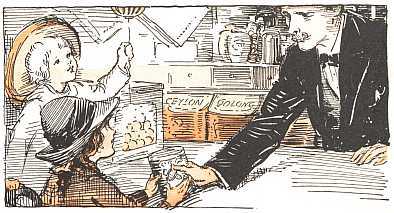
"Then here is the corn. Take it to mother and tell her about the ice."
Off went the children. When they came to the bridge, Peter dropped some small stones on the ice. But it did not break.
"It must be thick now, Polly," said he. "I wish we could skate."
"We weigh more than those stones do, Peter. I think the cold will have to make the ice grow more before father will let us. And, anyway, we have no skates."
"Let's tell mother about that, too, Polly. Perhaps she knows where there are some."
So Peter and Polly hurried up the hill to find their mother.

"Polly and Peter," said Mr. Howe, "I have something for you. It is something to use in the winter, and not in the summer. You may have three guesses."
"It can't be a sled," said Polly, "for we have sleds."
"It can't be a coat," said Peter, "for we have coats."
"And we have mittens and leggings and overshoes, too," said Polly.
"It might be my pony," said Peter.
"No," said Polly. "It couldn't be, Peter. We can use a pony in the summer. Let's not guess that."
"Is it good to eat, father?" asked Peter. "I am hungry now."
"No, Peter. And there are four of them; two for each of you. They are hard and shiny."
"Guns, guns!" shouted Peter.[37]
"One guess is gone, Peter. What would you do with two guns?"
"Are they for us to wear, father?" asked Polly.
"Yes, Polly, but not all the time. You cannot wear them in the house."
"Then I know what they are, father. If there are two for each of us, that is one for each foot. Can't you guess now, Peter?"
"Rubber boots," shouted Peter.
"I think it is skates, father. And I am glad. I have wished for some ever since we saw the ice."
"You have made a good guess, Polly. Bring me the box that is in the hall."
Out of the box Mr. Howe took two pairs of shining new skates.
"Oh, goody, goody!" cried both children, when they saw what was in the box.
"We will go skating now," said father. "Then we can try them."
At the edge of the river he stopped. He put on the children's skates. Then he put on his own.
"I will show you how to do it," he said. "Then I will help you just a little."
He showed them how to strike out, first[38]
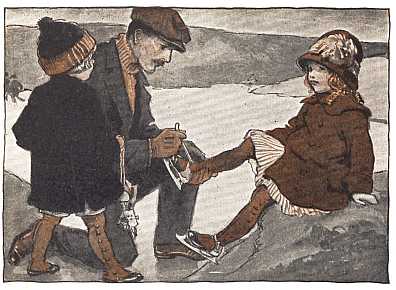
with one foot and then with the other. His tracks looked like this:

Then Polly tried, but her tracks looked like this:

"That is not the way, Polly," said her father. "You are skating with your right foot. But you are only pushing with your left. You must skate with both. Watch me again."[39]
Then Peter tried. His tracks looked like this:

The cross marks the place where Peter fell down. But he did not care. He got up and tried again.
Polly was doing better. So her father took hold of her and helped her a little.
He said, "I wish you to learn alone. Then you will be a good skater. If I help you all the time, you will never be able to skate alone."
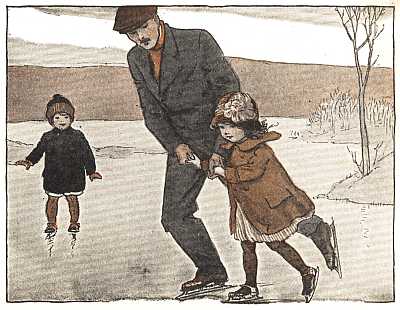 [40]
[40]
Polly said, "That is what my teacher tells us. She says, 'I will show you how to do it. And I will help you a little. Then you must try for yourself.'"
"That is good," said father. "You must learn to do things alone. Your teacher and your father will not always be near."
Soon the skates were taken off. "We must not stay too long the first time," said father. "You may come again to-morrow. You may skate every day until the snow comes."
"Oh, may we, father, may we?" cried Peter and Polly, jumping up and down. "And when the snow comes, we can sweep it off the ice."
"Maybe I shall not wish for any snow now," said Peter. "Maybe I like skating better."
"You will get the snow just the same, my son," said father. "So you may as well wish for it. It is sure to come."
"Now, good-by. We have all had a good time. Take my skates home with you and dry them when you dry yours. Then they will not rust. We will bring mother the next time we come."
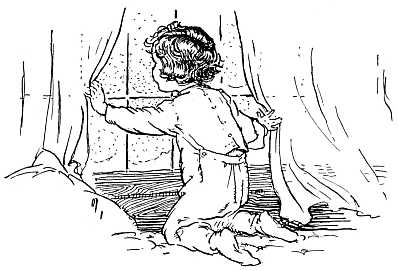
One morning mother called to Peter, "Wake up, Peter! Look out of your window. Winter has come."
Peter had been dreaming about a big snow man who chased him. He jumped out of bed and said, "You didn't get me that time, old snow man. I woke up too soon."
He ran to the window. The ground was white. The trees were white. The air was full of the white butterflies that Peter likes so well.
"Oh! Oh!" he shouted. "I must go out to play! I must go out to play!"
"Not until you are dressed, Peter," said mother. "Then you must have breakfast. After that you may go out."[42]
At breakfast father said, "It has snowed a foot since dark yesterday. How many inches is that, Polly?"
"It is twelve inches, father. Do you think this snow has come to stay? Or will it melt away?"
"I think that it will stay, Polly. It is time for sleighing."
Peter and Polly put on their coats and caps, their leggings, overshoes, and mittens. Then they were ready to go out.
At first Peter ran about in the yard. He kicked up the snow as he ran. It flew all over him.
"Polly, Polly!" he called. "I am a snow man now. I shall chase you as the one in my dream chased me."
He ran after her. Just as he caught her, she slipped. Down they both went. They were covered from head to foot with snow.
"Now we are both snow men," said Polly. "Let's go and shake the little trees."
These were two fir trees. They were at the side of the house. Polly took hold of the end of a low branch. Peter stood under the tree, while Polly shook it. Down came a shower of snow.[43]
Then Polly stood under the other, while Peter shook that. Down came another shower of snow. Some of this went into Polly's neck. But Polly did not care.
"Now we will show grandmother how white we are," she said.
Grandmother heard them coming. She went out on the piazza.
 [44]
[44]
She said, "I see two snow men. I cannot ask them in. Snow men would melt near the fire. Then they would be nothing but water."
"Oh, yes, grandmother, they would be Peter and Polly," said Peter.
"Why, Peter! Why, Polly! Is this really you? I have no spectacles on, this morning. Where are your sleds?"
"In the barn, in the barn!" shouted Peter. "We could not wait for them."
"See the posts of your fence, grandmother," said Polly. "They all have on tall white caps."
"So they have, Polly. And how clean the snow caps are. How clean the snow makes everything. We are all glad to have it, aren't we?"
"I am, I am!" shouted Peter. "Winter has come, winter has come! Good-by, grandmother. I must go and play."
"Good-by," called grandmother. "Come down to dinner, if mother will let you. We will have sugar on snow."
"She will let us," called Peter. "I know she will. And I will get the pan of snow for the sugar."

All that day Peter and Polly played in the snow. All day Peter's white butterflies fell. Down they came out of the air, softly and silently.
Peter liked to stand and look up into the sky. He liked to feel the soft flakes light upon his face. He liked to see them on his coat sleeve.
Polly said, "Aren't the flakes pretty, Peter? They are little stars. The perfect ones have six points. The Story Lady told me a story about a star snowflake. I will tell it to you.
"Once a little water fairy lived in our brook, back of grandmother's house. One day she was very, very naughty. She did not wish to go up into the air. She did not[46] wish to be part of a cloud. She wished to stay in the brook.
"Her father said, 'You must go. And I shall have you punished for being so naughty. I shall have Jack Frost change you into a snowflake.'
"Jack Frost came one day to change the cloud into snowflakes. He saw how sorry the water fairy was because she had been so naughty.
"So he said, 'You know that I have to make all snowflakes like stars. Some of them are very pretty. I will change you into the prettiest star snowflake that I know.'
"'And when you melt,' said Jack Frost, 'you will be a water fairy again. You will always be good then, won't you?'
"So he changed her into a beautiful star snowflake. I have seen her picture. The Story Lady showed it to me."
"Let's find her," said Peter. "Then let's show her to the Story Lady. That will be better than the picture."
So the children looked and looked. They found many stars. But Polly was not sure that any one of them was the right one.
At last Peter found the most beautiful star[47] of all. "This is the water fairy, this is the water fairy!" he cried.
And Polly said, "It does look like the picture. So let's go and show it to the Story Lady."
Down they went to her house and into the kitchen. There was the Story Lady, washing dishes.
"O Story Lady," said Peter. "I have the water fairy on my arm! She is changed into a star. See her!"
But when the Story Lady looked, there was no star snowflake.
"She has gone," said Peter. "That is too bad." And he looked ready to cry.
"Why, yes, Peter," said the Story Lady. "She has gone. But don't you think that she is happy to be just a water fairy again? She likes that better, you know. You must be glad that you found her and helped her melt."
"I am glad," said Peter. "But it was only a 'Once upon a time' story, wasn't it?"
"Of course it was, Peter. But don't you know that all snowflakes are water fairies? Now run along and play with those that are left."

Grandmother was getting ready for Thanksgiving. Peter and Polly and father and mother were going to her house on that day.
So grandmother was making mince pies. She was making other things, too. One was fruit cake.
Peter and Polly were down at grandmother's, helping. At least, Polly was helping and Peter was hindering.
He seemed bound to stand just where grandmother wished to walk. He spilled a cup of milk on the table. After he had wiped it up, he upset some flour.
But he did not mean to hinder.[49]
Polly watched her grandmother make the pies. She watched her roll the pie crust thin and trim it to the size of the plate.
She said, "If I had some dough, I am sure I could do that."
Her grandmother gave her some and a little plate. Polly rubbed the plate with melted butter. Then she rolled out the dough and put it on the plate.
"That is very good, Polly. Now we will fill our pies. Here is the mincemeat."
Polly tried to make her little pie look like grandmother's large one.
"Next we must put on the covers," said grandmother. "Roll yours out like mine."
She had Polly stick a knife through her cover in four places. Ask your mother why she did this.
Then she helped Polly put on her cover, for that was quite hard to do. Last of all she showed her how to pinch together the edges.
"Now," said grandmother, "we will bake our pies. What shall you do with yours?"
"I should like to take it home to show mother and father. May I?"[50]

"Why, to be sure. They ought to have a bite of your first pie. Please, Peter, carry this pail of sugar into the pantry for me. I do not need it any more."
The pies were baked brown. As soon as hers was cool enough, Polly carried it up the hill to mother.
"See, mother," she said, "I can cook now. Grandmother let me make a pie. It is for you and father."[51]
"How good it looks, Polly! We will try it for dinner. You have done this well. I see that I must begin to teach you to cook.
"Bread comes first. The next time I sponge bread, you may try. Your first good loaf you may take to grandmother."
"Oh, may I, mother? I want to learn to cook. Then I can cook for you and father. I watched grandmother all the morning. I helped her, too."
"So did I help grandmother," said Peter.
"O Peter, what did you do to help?" asked Polly. "You spilled the milk and then you spilled the flour. That isn't helping much."
"I did help," said Peter. "I helped all the morning. I worked very hard."
"I am sure that you meant to, Peter," said mother. "But tell me what you did."
"Why," said Peter, "why, I carried away the pail of sugar."
Polly laughed, but mother said, "That was kind, Peter. And you know that you always help by being a good boy. So I really think that you are right."

"Let's make a snow man this morning. Will you, Peter? The snow is just right for big balls."
"Then we will," said Peter. "But let's get Tim to help us."
Tim is Peter's playmate. He lives on a farm. His house is farther up the hill. Look for it on the map in the front of this book.
Soon Tim was down at Peter's. His big dog Collie was with him. Wag-wag and Collie are friends. They often play together.
The three children began to roll snowballs. Polly's grew very large. The boys had to help her with it. They pushed it over and over. At last it was quite near the edge of the bank.
"One more push," said Polly. "Then it will be just right. People can see the man from the road."[53]
But that push was too much. Over the edge of the bank the big ball rolled.
"Oh, stop, stop!" cried Peter. "Do not run away. We will make you into a good snow man."
But the ball did not stop. It rolled against Tim. It knocked him flat. Peter and Polly fell down the bank after it. At last it smashed itself against the fence.
"Never mind," said Polly. "We can make another. Do not let the next one knock you down, Tim."
"Old snowball ran over me," said Tim. "But I do not care. He smashed himself."
Another big ball was made. It was rolled into place. Then smaller ones were lifted on it. These were for the body.
At last the head was ready. Polly stood in a chair. She stuck the head on the body. She made eyes, a nose, and a mouth with small sticks.
She put an old hat on the head. She put a branch under the arm.
Then she said, "We will name you White Giant. You may take care of our house at night. In the daytime you may play with us. Will you, old Giant?"[54]
Polly did not think that the snow man could talk. But just then she heard some one say, "Of course I will play with you, Polly."
"Oh, oh! Has he come alive?" cried Peter. "Can he chase me? I do not wish him to do that." And he ran behind Polly.
"I cannot chase you, Peter," the snow man seemed to say. "I cannot move at all in the daytime. But at night you should see me."
"I saw you the other night in a dream," said Peter. "I did not like you. You chased me."
"I will never do that again, Peter. So you must not be afraid of me."
Just then Tim cried out, "Look, look!" And there behind a tree was Peter's father.
Polly laughed. "I know now that the snow man did not talk," she said. "At first I thought he did. It was you, wasn't it, father?"
"Why do you think so, Polly? You didn't see me. Did it sound like me?"
"No, it did not, father," said Peter. "And I think it was the snow man. I am going to watch him to-night and see."
[55]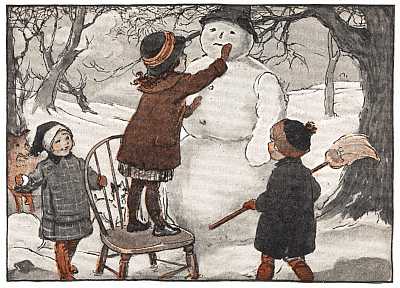
"Why don't you?" asked father. "I should like to know about it. You tell me when you find out. Where are your mittens, Tim? Aren't your hands cold?"
"I've lost them. And Peter has lost one of his red ones. We can't find them at all."
"Perhaps they are under the snow. The sun will help you find them by and by. Peter, run in and tell mother. She will get some mittens for you and Tim to wear.
"When you come back, bring the old broom. That is better than the branch for your snow man. If you watch to-night, you may see what he does with it."

At bedtime Peter said, "I want to sit up. I am going to watch the snow man."
"Why?" asked mother.
"I heard him speak," said Peter. "He said he would not chase me. He said I ought to see him at night. He can move then."
"Very well," said mother. "But you might get into your bed. You can watch him from your window."
"I did not think of that, mother. I will go now."
Soon Peter was in bed. By sitting up, he could see the snow man. His window was wide open. But Peter had on thick night clothes. He did not feel the cold.
The moon was bright. Peter thought of his friend, the Fairy Bird. He wished the Bird would come again and take him to the moon.[57]
All at once he rubbed his eyes. Where was the snow man? He looked again. The snow man was gone!
"Oh, oh!" said Peter to himself. "I've lost him. That's too bad. Now I shall not see anything."
But just then the door opened softly. Peter saw something white coming into his room. It was the snow man!
Peter was so surprised that he nearly jumped out of bed. He was frightened, too. He called, "Oh, dear!"
"Sh, sh, sh!" said the snow man. "You'll wake every one in the house. I came up here to please you. I don't care to see any one else.
"It was hard work climbing the stairs. You children didn't make me very good legs; nor very good arms, either, I must say. I have no feet and no hands.
"My hat came off when I broke myself away from the snow. But, without hands, I couldn't put it back on my head.
"I do wish that you would make me better next time. You can, if you try. But I'm thankful you gave me eyes and a mouth, too. I like to see and I like to talk."[58]
"Don't you like to eat?" asked Peter. "What do you eat? Oh, dear! I'm afraid you eat little boys like me."
The snow man began to shake. Bits of snow dropped on the floor.
"Why, Peter, I believe you are afraid of me. You needn't be. You'll laugh, too, when I tell you what I do eat. Sticks and twigs and leaves that I pick up when you are rolling me.
"Best of all I like mittens. I don't get very many. But I ate yours and Tim's this morning. They were good. I like red ones best. And I had only one red mitten."
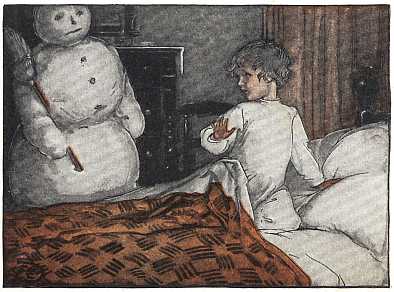 [59]
[59]
Then Peter did laugh. "What queer things to eat," he said. "And how funny you look when you laugh. You shake, but you do not laugh with your mouth."
"Yes," said the snow man. "That's all because of Polly. You see, she made my mouth with a horrid straight stick. I can't bend it at all."
"You make me very cold," said Peter. "You are so white. I want my mother to come and tuck me up."
"I will try," the snow man said. And, with his snowy arms, he tried to pull up the bedclothes. One arm slipped and hit Peter's neck. Peter was so surprised that he screamed.
In just a minute mother ran in. "What is it, dear?" she asked.
Peter could only say, "The snow man, the snow man! He has been up here!"
"He's out in the yard, dear. I can see him. And he has lost his hat. The wind must have blown it off. It has been raining hard. The rain has come in at the window. It is wet on the floor."
"He didn't have his hat up here," said Peter. "He dropped it when he started.[60] He couldn't put it on. And he made those spots on the floor. It was not the rain. Pieces of snow dropped off him when he laughed."
Mother only said, "I'll tuck you up again, Peter. We can see about it in the morning. Now good night."

In the morning the rain had stopped. The children went to look at the snow man. He had grown much smaller in the night. There was a crack near the bottom of his legs.
"He did walk, he did, I know he did!" cried Peter. "That's what made the crack. And, O Polly, look at this!"
Sticking out of the snow man's stomach was the end of a red mitten!

It was nearly Christmas. Peter could hardly wait for the day to come.
He kept saying, "Mother, will it be Christmas to-morrow? Mother, will it be Christmas to-morrow?"
At last father said, "Do you want Christmas before I get the tree?"
"No," said Peter. "But will you ever get it?"
"I will to-day. You and Polly may go with me. We will choose the prettiest fir tree we can find. Put on your things, and we will start now."
"Oh, goody, goody!" cried Peter, jumping up and down. "Now I know that Christmas is almost here."
"It will be here to-morrow," said father. "Run and tell Polly."
They went through the field back of the[62] house. They climbed over the stone-wall post office. Polly looked into some of the boxes for mail.
She said, "Father, one day Peter told me that he had a pony in his post-office box."
"It must have been a very large box, Polly. We do not have such large ones at the store. Which is it?"
"I don't care if I didn't have it in my box," said Peter. "I think I shall get it on the tree. It will be up in the tiptop."
"Then we must find a strong tree, my boy. Can you see one you like?"
"That one," said Peter.
Father laughed. "That is a strong tree. But it is too tall. We should have to cut a hole in the ceiling to stand it up. Find a smaller one."
"There is a good tree, father. See how pretty it is. It looks like our little firs at home."
"I believe that is just right for us, Polly. I will cut it down. Please hold my coat."
Father swung his ax. He gave three sharp blows. All at once there was a chatter overhead.
In the next tree a gray squirrel was running[63] up a large branch. He was scolding with all his might. His tail was jerking. He looked very cross.
"Well, old fellow," said father, "did I disturb you? I am sorry. Go back to sleep. We will not take your tree."
"His is too bare, isn't it, father? The leaves have all gone. We must have a fir tree for ours. It has queer leaves. But they do not fall off in the winter."
"That is why we call such trees evergreens, Polly. They are always green. Pine trees are evergreens, too. Their needles are longer than fir needles."
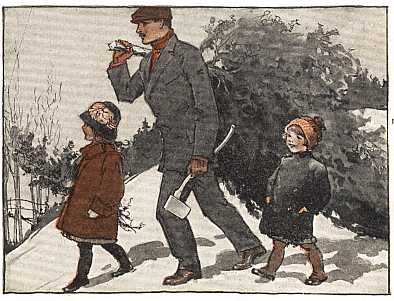 [64]
[64]
"I think that is one of our squirrels," said Peter. "He took our nuts, Polly. I wonder where he put them."
"He thought they were his," said Polly. "He needed them."
Soon father had cut down the fir. He put it over his shoulder. The end dragged on the snow.
"Now we are ready for home," he said. "To-night mother and I will dress this tree. To-morrow you may see it."
"Have you really a dress for it?" asked Peter. "I hope it is red. Who made it?"
"O Peter, how silly you are! Father means dress it up with candy bags and popped corn and presents."
"I know now," said Peter. "Ponies and guns and things."
"See the snow sparkle, children. The sun makes it do that. Look at the blue sky. Doesn't the air feel good to you?"
"It makes me feel like running," said Polly.
"Then run along, chicks. You will get home first. Tell mother that the Christmas tree is really coming. You may pop the corn this afternoon."

When Peter and Polly got home, they ran into the house.
"Mother, mother!" they shouted. "The Christmas tree is coming. Father has it."
"Why, mother," said Polly, "what makes the house smell so sweet? It smells just like the woods."
"It is the green wreaths, Polly. I have them in all the rooms. There is one on the front door, too. These wreaths smell better than the ones that we buy. You may help me make the rest of them. We need more."
So the children went into the kitchen. On a table were pieces of evergreen boughs.
They helped their mother twist the pieces into circles. On each circle she wound many small twigs. When done, the wreaths were firm and thick and green.
"How good it does smell, mother. I like Christmas smells. But see my hands."[66]
"That is the pitch from the greens, Polly. Just rub on a little butter. It will take off the pitch. Then wash your hands in warm water. I will clean up the rest of the greens. When this is done, we will pop our corn."
That was always fun. Polly liked to shake the popper. She liked to see the white kernels of corn hop up and down. She liked the good smell, too.
Soon two large panfuls were popped. Then came another task. The corn must be strung. Polly and Peter both helped. But, of course, mother could string faster than they. She told them stories while they worked.
"When I was a little girl," said mother, "we did not have a Christmas tree. Instead, we hung up our stockings. We hung them near the fireplace. We thought Santa Claus could reach them better there.
"I was the smallest in our family. So my stocking was the smallest. My presents would never go into my stocking. This used to tease me.
"My dear grandmother found it out. One day she said to me, 'I am going to[67] knit you a new red stocking. It is not to wear. It is for you to hang up.'
"And the very next Christmas, what do you think? She had knit me a stocking as long as I was tall! How pleased I was to hang it up!
"Now, children, the Give-away Box is ready. You may choose your things to give away."
On the floor in the dining room there was a large box. It was filled with games, dolls, bags of candy and popped corn, and many other things.
These were for Peter and Polly to give away. They would make other children happy. And that would make Peter and Polly happy, too.
Peter chose a jumping jack for Tim. Polly chose to give him a whistle.
"He cannot whistle with his mouth yet," she said. "Perhaps Collie will come for this whistle."
When Polly was out of the room, Peter chose a present for her. It was the prettiest doll that he had ever seen.
Polly chose a train of cars for Peter. But he did not know that.[68]
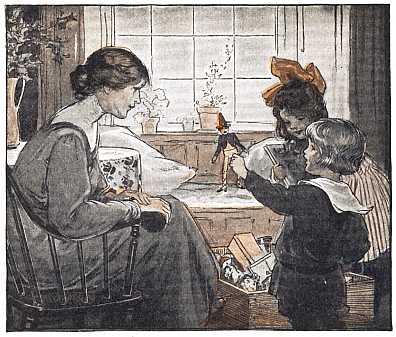
"We can give this candlestick to Mrs. White," said Polly. "She gave us back our Jack-o'-lanterns. I think she would like it."
Mother said, "Why don't you give the hot water bag to grandmother? Her bag leaks."
"Oh, we will, we will!" cried both children.
"Farmer Brown is our friend," said Polly. "He showed us his sheep. Mrs. Brown is our friend, too. She gave us a[69] party last summer. The lambs came to it. It was on her steps. Let us give them two wreaths."
"There is my teacher," said Peter. "I will give her these marbles."
Polly said, "Your teacher! You don't go to school, Peter."
"I did one day," said Peter. "I like her. She was good to me. She is my teacher. I don't care what you say."
"Never mind about that, chicks," said mother. "I'm afraid she hasn't a pocket for the marbles. Why not give her the box of handkerchiefs?"
Before long the Give-away Box was empty. The presents were tied up. Every friend in the village had been remembered.
Peter and Polly were tired. They were glad when it was bedtime.
As mother tucked her up, Polly said, "I like the Give-away Box. It is fun. It is as much fun as it is to get things. You gave it to us, mother. You give us everything."
"Father, too," said mother. "And it makes fathers and mothers happy to do that."
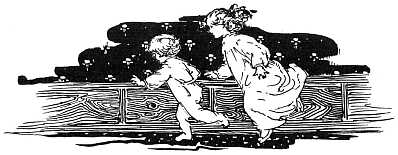
Early Christmas morning Peter awoke. He heard a noise in mother's room. So he knew that he might get up.
He pushed open the door. "Merry Christmas! Merry Christmas!" he shouted.
"Merry Christmas," said mother, hugging him tightly.
"Merry Christmas," said father, tossing him up into the air. "Did you see Santa Claus last night?"
Just then Polly ran in. "Oh, oh, it is Christmas!" she cried. "Merry Christmas! Merry Christmas! See what I found in my bed."
It was a box of animal crackers. They were all sheep.
"O father! You did it for a joke. You know I do not like mutton."[71]
Peter ran to look in his room. He thought a joke might be there, too.
"See, see!" he shouted. "I have found a letter box. That is not a joke."
"Look inside," said father.
Peter looked. There he saw a very small pony. It was made of cloth. On its back it had a cloth monkey.
"A joke, a joke!" cried Polly. "Your pony came in your letter box after all."
There were to be no more presents until after breakfast. So the children dressed quickly.
It was hard for them to eat anything.
At last Polly said, "I cannot wait another second. I will eat my breakfast with my dinner. Here comes grandmother. Now may we open the door and see the tree?"
"In just a minute," said father. "You say 'Merry Christmas' to grandmother. I have one last thing for the tree. You may come in when I call." And out he ran.
"I wonder what it is," said Polly. "I can hear him coming back through the side door."
Then grandmother came in, and Polly forgot to wonder any more.[72]
At last they heard father shout, "Come!"
Polly opened the door, and the children rushed in.
"Oh! Oh!" said Polly.
"Oh! Oh!" said Peter.
Such a beautiful tree they had never before seen. It was hung with strings of popped corn and red cranberries. It was covered with colored balls and big gold stars. Over it was white, shiny stuff that looked like snow.
It had candy bags and oranges. At the top, there was a doll with wings. And there were many boxes and packages.
"Oh! Oh! Oh!" said both children again.
"Do you like it?" asked mother.
"I never saw anything so pretty," said Polly. "Is that a fairy at the top?"
"I think it is Santa Claus's little girl," said Peter. "I should like to have her for my own."
"Should you rather have that than anything else here?" asked father.
"I think so, father. May I?"
"Walk around the tree and see if you are sure, my son."[73]
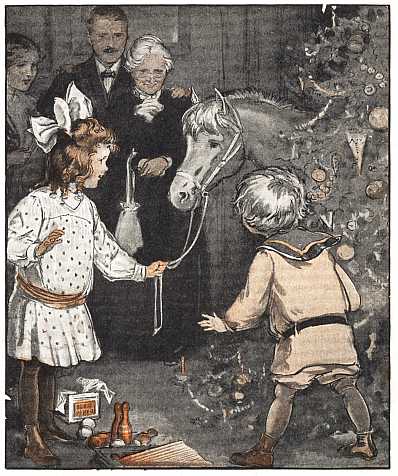
Peter did as he was told. He had not taken many steps when he jumped back with a cry.
"What is it? What is it?" he asked.
Polly ran forward, and what do you think she saw?[74]
On the other side of the tree something moved. Polly saw two large eyes, two long ears, a brown head, and then she knew that it was a pony.
"Peter, Peter!" she cried, "here is the pony! It is on the Christmas tree! O Peter, Peter, Peter!"
"Lead her out," said father. "She will come with you. She likes children."
So Polly took hold of the little strap. And the pony walked out into the room after her.
"Her name is Brownie," said father. "She is grandmother's present to you and Peter. She is half yours and half Peter's."
"O grandmother!" cried Polly. "I thank you now, but I will thank you better by and by."
"Which half is mine, grandmother?" asked Peter.
"Half of both halves," said grandmother. "Why?"
"Nothing," said Peter. "I love both her halves. And I love you, too. And I love the tree, and Christmas, and everybody."
"And so you should," said father. "Come now, we will take Brownie to her stable. Then you may get the presents off the tree."

One day there was a heavy snowstorm. At the same time the wind blew. It heaped the snow over the road in front of Polly's house.
The snow was so deep that horses could not walk through. Men had to dig the road out.
Mr. Howe helped to do this. Peter and Polly watched the work. They thought it great fun.
The men threw the snow by the side of the road. Soon the piles were very high. They were twice as high as Polly could reach.
A few days after this Polly said, "I know what we can do."
"What?" asked Peter.
"Let's play Eskimos."
"How do you play it?" asked Peter.
"Well," said Polly, "first we must make[76] a snow house. Then we can think of other things to do."
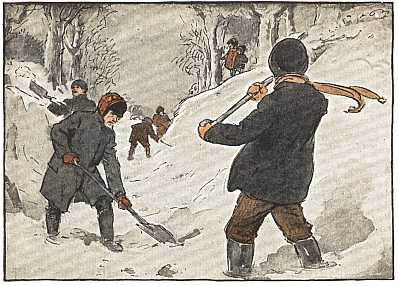
"We can't," said Peter.
"Can't what?" asked Polly. "Can't think of things to do? I can, if you can't."
"No," said Peter, "we can't make a snow house. We tried. It tumbled down. Don't you remember?"
"I've thought how to do it, Peter. Come on. I will show you."
Polly took Peter to the great pile of snow by the side of the road.
"There is our house," she said. "It is all made for us."[77]
"That isn't any house, Polly. I think I won't play with you to-day. You tease me. I am going to see Tim. Good-by."
"O Peter! Wait, wait! I won't tease. I will tell you about it now. That is our house really and truly. But it is just the outside.
"We must make a hole in the pile for a door. Then we must dig out the inside. Can't we do that, Peter?"
Peter said, "Oh, yes. We can do that. I see about it now. I will help. We can dig very well.
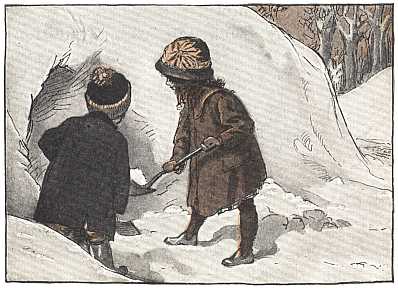
"We dug our cyclone hole last summer.[78] Perhaps we shall find another box with silver dollars in it."
"Perhaps we shall not, too," said Polly. "I don't expect to find things in the snow. People hide their gold and silver in the ground.
"The ground does not melt. Snow does. So it would not hide their gold and silver very long."
"Why doesn't the ground melt, Polly?"
"Well, I don't know. You ask father. Snow melts because it is made of water."
"Butter melts, sugar melts," said Peter. "They are not made of water. I wish to know why the ground does not melt, too. I wish to know now."
"Peter, can't you stop asking questions and go to work? See, first we must dig a path here. Then we will begin our door."
It took a long time to dig the path. But at last it was finished. Then they made a hole. It went straight into the side of the big snow pile. That was for the door.
"Now we must hollow out a place," said Polly. "It will be our room. We must make it large. We shall sleep there and eat there and live there. That is the way[79] the Eskimos do. I read it in a book at school."
"I'd rather live in a house," said Peter. "Let's live in the house and play out here."
"Then we will," said Polly. "It would be cold here anyway. I should think Eskimos would freeze in snow houses. But they do not."
The next day the children scraped out more snow, and the next and the next. At last they had made quite a large room.
It was nearly round. The floor was packed hard. The white walls were smooth. Polly could stand up straight in the middle.
Mother gave them an old rug for the floor.
She said, "Eskimos have fur rugs. You must play that this is bearskin."
Father said, "Do you know what Eskimos call a snow house? It is igloo. Perhaps some day I will try to crawl into your igloo. I should like to see it."
"Oh, do, father. Then we will have a party. It is quite warm inside. But we can make the door bigger for you."
"Never mind about that," said father. "Perhaps I can get a fairy to shrink me. We shall see."

For many days the children played in their igloo. More snow fell. They dug it out of the path. Then they could get to the door.
"It only makes our house taller," said Polly. "It does not hurt the inside. I do not care how much snow comes on top of it."
"You may care some day," said father. "Snow is heavy. After a while it may break down your roof."
"What if we are inside when the roof breaks, Peter? The snow will get down our necks."
"It will do more," said father. "It will bury you."
"Will it hurt us, father?"
"I think not. But you will look like snow men afterward."
One day Tim was playing with Peter and Polly. They were in the igloo. Collie was outside playing with Wag-wag.[81]
Wag-wag could go into the igloo. But the children did not like to have Collie there. He was so large that he took up too much room.
Polly was the mother Eskimo. Peter was the father Eskimo. Tim was the little boy Eskimo.
Mother Eskimo. "I think we need some meat. We need a seal. I can use its skin. I will make boots of it."
Father Eskimo. "I killed a bear yesterday. Use the bearskin for boots."
Mother Eskimo. "Oh, no. That would not make good boots. I need sealskin for them. Besides I wish to use the bearskin to make some trousers. I must have new ones."
 [82]
[82]
"O Polly," said Peter, "women do not wear trousers."
"Eskimo women do, Peter. Now you go and catch me a seal."
Father Eskimo. "But it is cold. I may have to watch many hours for a seal. I must sit very still beside his hole in the ice. If I move, he will not come up there to breathe. Perhaps I shall freeze, sitting so still."
Mother Eskimo. "No, you will not. Do I not make you good fur clothes? Do I not sew them with my good bone needle? They will keep you warm."
Father Eskimo. "Yes, but don't I have to get the fur for them? That is harder than making the clothes."
Mother Eskimo. "I am not so sure that it is. Should you like to scrape the skins to clean them? Should you like to chew them to make them soft?"
Father Eskimo. "No, I should rather hunt than chew skins. So I will go now."
Father Eskimo crawled out of the igloo. He called to the dogs.
"Come here, dogs. You must drag my sledge. I am going out to catch a seal. You must draw it home on the sledge."[83]
The dogs were jumping up and down and playing with each other. They did not know that they were Eskimo dogs.
Peter could not get them. He grew quite cross. He crawled back into the igloo.
"I cannot catch the dogs," he said. "I shall not go hunting. I shall not play Eskimo any more to-day."
Polly started to speak. But instead she screamed. Something was happening. What were the dogs doing? Were they on the top of the igloo?
The roof was breaking. She could see the leg of one dog sticking through. Then something fell on the children.
It was the snow roof. It was also two dogs. Collie and Wag-wag had broken down the igloo.
Father was just coming home. How he laughed when he saw the children and the dogs. He pulled them out from under the snow.
He said, "Aren't you glad you are not real Eskimos? Aren't you glad you live in a strong house? Let's all go in and see what mother is cooking for supper. It will not be seal meat. Tim must come, too."
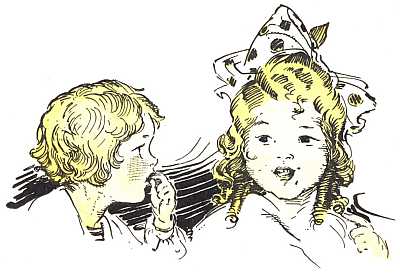
Peter had a loose tooth. It was a lower front tooth. It was his first loose tooth. He had always wanted one.
When Polly's teeth became loose, he would feel of his.
He would say, "I wish I could wiggle mine, too. I wish I could pull mine out."
Mother said, "You are not yet old enough to lose your teeth. I am glad that you are not. Why do you wish to have a loose tooth?"
"Because they are nice to wiggle," said Peter. "Because Polly is faster than I am. She has had four. I like the holes in her face, too. She can make a funny noise through them. It is a whistle."[85]
"Your turn will come by and by," said mother. "I suppose you will lose your upper front teeth first."
But it happened one day that Peter fell down. He bumped his nose. He also cut his lip on a tooth.
He must have bumped that tooth quite hard, for it became loose. Peter was much pleased.
"I should let it alone," said mother. "Perhaps it will grow tight again."
But Peter could not seem to let it alone. He wiggled it with his tongue. He wiggled it with his fingers. At last he made it very loose.
Then he said, "Polly, I must pull my tooth."
"Oh, let it come out," said Polly. "Two of mine did."
"No," said Peter. "I shall pull it. You pulled one of yours with your fingers. I shall do that."
But the loose tooth would not come out.
"It will not pull," said Peter. "I shall put a string on it. I shall tie the end of the string to the door. Then I shall shut the door hard. It will pull my tooth. You did that."[86]
"Yes," said Polly. "That was fun. But I know a better way now. I will show it to you."
She took a flatiron. She tied a string to it. She set it on the kitchen table. Then she tied the other end of the string to Peter's loose tooth.
She said, "This string is too short to reach the floor. You push the flatiron off the table. It will fall down and jerk out your tooth."
"Shall I now?" asked Peter.
"Yes, now."
So Peter pushed the flatiron. But Polly had not been right. The string was too long. It reached to the floor.
Down went the flatiron, bang! It landed on the edge of Peter's boot. It landed on the edge of Peter's toe, too. It hurt him, but not much. And the tooth did not come out.
"Oh! Oh!" cried Peter. "It hurt my foot, it hurt my foot! It didn't pull out my tooth at all." And he started to jump up and down.
The very first jump surprised him. Something pulled at his mouth and then seemed to let go.[87]

It was the string around his tooth. He had jumped up far enough to pull the tooth out himself.
How Polly did laugh when she saw this!
Peter cried, "It's out, it's out! We have found a new way! I found it!" And he got down on the floor to pick up his tooth.
"I am going to save it to plant in my garden," he said.
"To plant!" said Polly. "What for?"
"So I shall have more," said Peter.
Then Polly laughed again. She ran to tell mother about Peter's garden.

One morning father said, "I am going to Large Village to-day. You children may have a ride. You may go as far as Farmer Brown's. I will leave you there."
"Oh, goody, goody!" cried Polly.
"Oh, goody, goody!" cried Peter.
"You are to stay to dinner. I shall have my dinner at Large Village. Run and get ready."
"Oh, oh, oh!" cried both children at once.
Farmer Brown lived two and one half miles away. You must follow the road past Mr. Howe's store to find his house.
Peter and Polly liked to go there. They liked to see his horses, cows, sheep, pigs, and hens.
"We can see the sheep," said Polly. "They will not be in the pasture. The snow has covered the grass. Their wool will be thicker now than it was last summer."[89]
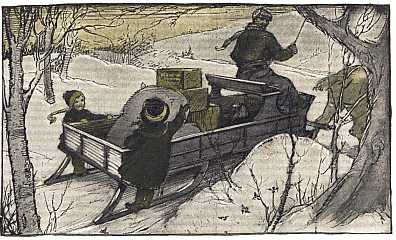
"We can see the pigs," said Peter. "Perhaps they will grunt at us."
They drove to the farm in a low sled. When they were out of the village, Mr. Howe stopped.
"Do you wish to ride on the runners?" he asked.
This was a great treat. Peter and Polly could never "catch rides" on people's sleds. Some of the other children were allowed to do this. But father showed Peter and Polly how they might get hurt.
He said, "If you 'catch rides,' I shall worry. I shall worry all the time. So I ask you not to do it. When you drive with me, you may 'catch rides' all you please."[90]
So, on the way to Farmer Brown's, he drove slowly. And the children jumped on and off the sled at any time they wished. It was fun.
The road followed the river all the way. But the river could not sing now. It was covered with ice.
They passed through thick woods. Many of the trees were cedar. They are evergreens. So they had not lost their leaves.
"Look there," said father, stopping the horse.
On one tree were many little birds. They looked black and gray. They were hopping about from twig to twig. They were calling, "Chick-a-dee, chick-a-dee."
"I know them," said Polly. "They are saying their own names over and over. They are getting their breakfast. Aren't they cold at night, father? Where do they sleep? I wish they would come to our house."
"I hope they sleep in some old hole, Polly. Then they can keep one another warm. Perhaps they rent part of a woodpecker's hole for the winter.
"We must put out some food for the birds to-morrow. Do not let me forget."[91]
At last Mr. Brown's house was in sight. The farmer and his wife came to the door to meet them.
"Well, well," said Mr. Brown, "here are our little friends. Your cheeks are red. You look as if you had been running. Didn't your father give you a ride?"
"Oh, yes," said Polly. "But we have been running behind. We have been catching rides on his sled. He lets us.
"He lets us ride on the runners, too. He does not wish us to do it except on his sled."
"I hope that you mind him," said Mr. Brown.
"We do," said Polly.
"Shall we go out to the barn?" asked the farmer. "Where is Wag-wag? Didn't you bring him? He might have come."
"I didn't know he was invited," said Polly. "Yes, let's go to the barn. Let's see everything you have there. Have you any little lambs?"
"It is not quite time for little lambs yet. But you can see all the sheep. They look fatter than they did last summer. That is because their wool has grown longer. When we get back, it will be dinner time."

"There is one hen that goes up into the hay," said Farmer Brown. "I think she lays her eggs there. But I cannot find them."
"Let us go up into the hay to look for them," said Polly.
So the children hunted. The barn was not very cold. Still it was not so nice as in the summer time.
At last Polly nearly tumbled over something. It was the brown hen. She flew away with a loud cackle. Then Polly saw four eggs lying in the hay.
"I've found them, I've found them!" she shouted. She gave Peter two and took two herself. Then they went down to show Mr. Brown.
"You have sharp eyes," he said.
"I used to think I could see better if I had spectacles," said Polly. "I used to think that I should have four eyes then."[93]
"I am going to feed the horses now," said Mr. Brown. "You may come."
While Mr. Brown did this, Peter and Polly looked carefully at each horse. They were hunting for one that they knew.
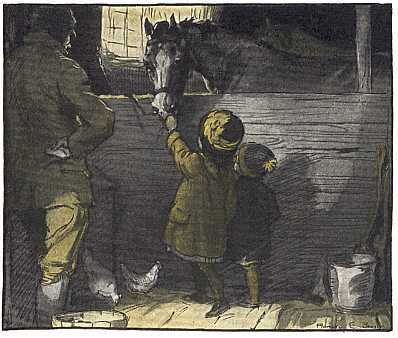
It was the old brown mare. They had ridden horseback on her last summer. That was when they went with John to hunt for the turtle's eggs.
"There she is, I think," said Polly.
"Are you looking for John's mare? Yes, that is the one," said Farmer Brown.[94] "You will not need her to ride any more. I hear you have a pony of your own."
Then the children told him about their pony. They told him about the Christmas tree.
"Ho, ho!" laughed Farmer Brown. "Who ever heard of a pony on a Christmas tree?"
"But think of a pony in a letter box," said Polly. And Farmer Brown laughed still more.
How warm the cow stable was! Polly said, "How can it be so warm? There is no stove."
"The cows themselves make it warm," said Mr. Brown. "See, here is one just the color of a deer. Isn't she pretty?"
"I guess the deer would be glad, if they had such a nice, warm house," said Polly.
"Yes, the winter is hard for them. It is cold, and food is not easy to find. There are two that sometimes come to our barnyard. I give them grain and hay and salt."
"I wish I could see a deer to-day," said Polly. "Let us go to the barnyard and look."
"We will feed the sheep now, Polly.[95] You can watch for one while I am doing that."
When the sheep were fed, it was dinner time. After dinner Mrs. Brown let the children play on the piazza.
All at once Peter said, "See the pretty cow coming down from the woods. Whose is she? Perhaps she is lost."
"Where, Peter?" asked Polly.
"Coming across the field. Now it is right there near the fence."
"Oh, oh!" cried Polly. "That isn't a cow. I think it is a deer. See its horns."
She called to Mr. Brown. Just as he came out of the house, the deer reached the fence. He walked quite close to it. Then he jumped over it.
"A pretty jump," said Mr. Brown. "The fence is more than four feet high. That is a fine stag. A stag is a father deer, you know."
The stag walked across the road. He jumped another high fence. Then he went off up the railroad track.
"Oh," said Polly, "I wish I could jump like that. He didn't run at all."
"It was a pretty sight," said Mr. Brown.[96] "I am sorry the old fellow did not stop for dinner. I am afraid he will have nothing better than bark and twigs, now."
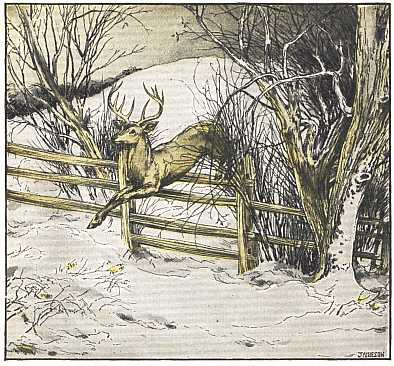
"It wasn't a cow, was it?" asked Peter.
"Cows can't jump like that, Peter. Though perhaps one did. I have heard of a cow that jumped over the moon. Have you?"
"Yes, I have. But I know she didn't really. Oh, here is father. We will tell him about my pretty cow."

"Do you remember something, father?" asked Polly.
"What is it, chick?"
"Something you told me not to forget, father."
"Let me think. What was it? Yes, I remember now. We were to put out some food for the birds. Is that it?"
"That is it. So, let us do it now."
"Very well," said father. "We will. But mother must help. She must give us bones."
"Bones!" said Polly. "Birds don't eat bones. But dogs do. If we put out bones, Wag-wag will get them."
"Wag-wag will not get these," said father. "I shall tie them up in the trees. Wag-wag has not learned to climb trees."
"I saw him trying one day," said Polly. "He was after a chipmunk. The chipmunk ran up a tree. Wag-wag put his fore paws[98] on the trunk. He stood up on his hind feet. He tried hard to get up that trunk. He barked and barked."
"What did the chipmunk do?" asked father.
"The chipmunk stopped on a branch over his head. He sat there and chattered. Grandmother said he was laughing.
"She told me he was saying, 'You can't come up, Wag-wag. You can't come up. You don't know how to climb. I am safe!'"
"Perhaps he was saying that," said father. "Now here are the bones."
"Oh, I see," said Polly. "They have meat and fat on them. That is for the birds. They need not try to eat bones."
"Yes, and here is grass seed. Some birds would rather have that. And here is cracked corn, too. It is for the larger birds."
He put the grass seed into small baskets. He did the same with the corn.
"Now we are ready," he said. "You help me carry these things out. I will come back for the stepladder."
Soon father had tied the bones to the[99] trees. He put them on the small branches. He tied them so that the birds could get at them easily. The birds could perch on the branches and peck at the meat.
He said, "I will not tie them to large branches. Some cat might walk out and catch our birds."
Then he fastened up the baskets. He fastened them tightly. They could not swing. The birds could perch upon the edge and eat the seeds and the corn.
"Now our party is ready," said father. "Do you suppose anything will come to it? We will keep food here the rest of the winter."
How Peter and Polly watched the food! It seemed as if the birds would never come. But at last they found it.
The very next morning Polly saw two birds eating there. She did not know what they were. She ran to tell mother.
"See our birds!" she cried. "We have two. What are they, oh, what are they?"
"You know them in the summer," said mother. "Then the father bird is yellow and black. You call them your canaries."
"But they have changed their clothes,"[100] said Polly. "They do not look the same. They are not so pretty."

"Many birds change their color," said mother. "Do you dress in the winter just as you do in the summer? How those birds like the seeds!"
"There, there!" cried Polly. "See that big bird. He is after the meat. I know him. He is a blue jay. Don't you frighten away my other birds, Mr. Blue Jay."
It was not long before many birds found the food. Day after day the chick-a-dees feasted. A few crows came. Once a flock[101] of snowbirds stopped at the party. And there were many that Peter and Polly did not know.
One day Polly saw a bird that she liked very much. It was a robin. She was surprised and pleased.
"I did not know that robins were here in cold weather," she said to him. "I like you best of all. You make me think of spring. Peter likes winter best. But I like you and spring. Please come to see me every day."
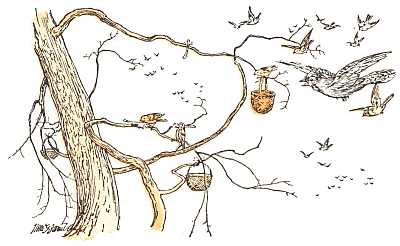
And the robin did for nearly a month. Then he came no more. Perhaps he grew tired of waiting for spring. Perhaps he flew south to find it. Polly never knew.
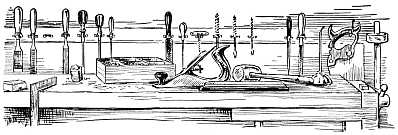
"I am going to begin to make something to-day," said father. "The stove is lighted. The workshop is warm. Who will be my helper?"
"I will," said Polly.
"I will," said Peter.
"Very well. You may both help. Come to the shop and guess what we are to make."
The workshop was in Mr. Howe's barn. In it was a large workbench. Tools hung on the walls. A box of tools was near the bench.
On the other side of the shop there was a very low workbench. It had two drawers. In the drawers were tools.
There were two small hammers. There were two small saws. There were two small screw drivers. There were two pots of glue. There were nails, tacks, and screws.[103]
The big bench and the big tools were for Mr. Howe. The little bench and the little tools were for Peter and Polly.
It was not hard to guess what was to be made. Father had laid the pieces of wood together. Any one could tell what they would make.
"It's a sled like your low one," said Polly. "I think it must be for Brownie. It is too small for a big horse."
"That is just what it is, Polly. Grandmother wished to give you a sleigh. But this will be better. If you tip over, you will not fall far.
"I am glad to have you learn to use Brownie in the winter, too. The snow will make a soft cushion, if you fall off your sled."
The parts of the sled had been made for father. He needed only to put them together. This did not take very long.
"Now," said father, "the carpenters have finished their work. We must draw our sled to the blacksmith's shop."
"What for?" asked Peter.
"For the iron runners, my boy. They will make your sled slip easily. The blacksmith[104] has been making them. He says that he will fit them on to-morrow."
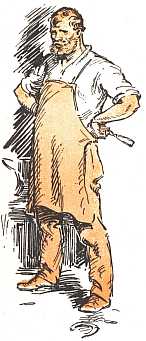
So the three took the sled to the blacksmith. On the way Polly rode a little. Then Peter rode a little. Father was the horse.
Once he played that he was running away. He tumbled Polly off into the soft snow. The children thought this great fun.
At the blacksmith's shop they saw the runners. These did not quite fit the wooden runners. Polly felt sorry about this.
But the blacksmith said, "Never you mind, Polly. I can heat them at the forge. That will make them soft. Then I can bend them as I wish.
"You ought to know about this. Haven't you seen me shoe horses? Haven't you seen me make the shoes fit?"
"Yes," said Polly. "But, you see, I forgot about that."[105]
The next afternoon the sled came home. The blacksmith's boy drew it. The iron runners were on. They fitted well.
"Now," said father, "we have another job to begin to-morrow. We must paint the sled. What color shall it be?"
The children talked about it a long time.
At last Polly said, "Peter likes red and I like red. May we paint it red, father?"
"Red is a good color," said father. "We will paint it red. See that your brushes are soft. You must help on the work, you know."
The next day the painting began. Each child had a part to do all alone. Of course, Peter got paint on his hands. And there were large, red spots on his clothes. But they were old, and no one cared.
The first coat of paint dried quickly in the warm room. Then another was put on, and the work was done.
Peter and Polly went to the workshop many times a day to look at the sled. They touched the paint with their fingers. Surely it must be dry.
At last father said, "The paint is hard now. The sled is ready for use. We will harness Brownie to it to-morrow."

"Now may we harness Brownie?" asked Polly.
"Now you may," said father.
He drew out the new, red sled. He put on Brownie's little harness. He helped the children harness her to the sled.
They jumped in. Polly had the reins. She said, "Get up, Brownie," and Brownie walked out of the yard.
"First, we will show grandmother," said Polly. "Brownie is grandmother's present. She must see us driving her."
They stopped in front of grandmother's house. Peter went in to call her to the door. Polly held Brownie.
"Well, well," said grandmother, "that is[107] nice. What a pretty sled you have. I like the color."
"We helped to make it," said Polly. "We wished you to see us first. We are going to show the children now. Hear our pretty sleigh bells. Good-by."
Down the hill Brownie trotted. Her bells jingled softly. She went across the railroad track and into the bridge.
Some of the village children were looking over the railing. They were watching men cutting ice.
When they saw Peter and Polly, they cried, "Here comes the pony! See Peter and Polly! Look at the red sled! Give us a ride! Oh, give us a ride!"
"Yes, we will," said Polly. "Come up on the street, where it is smooth. Two of you get in with us. We will take two more by and by."
Polly could drive quite well. She had often driven father's horse, when father took her with him. She let each child hold Brownie's reins.
"Let more ride at once," said one of the girls. "There is room in the sled."
"No," said Polly. "The pony is strong,[108] but she is little. I will not let her drag more than four. And two are enough, going uphill."

So they trotted up and down the street. Sometimes the boys and girls who were not[109] riding ran by Brownie's side. Brownie seemed to enjoy the fun as much as any of them.
At last it was time to go home. The children all patted the pony. This was to thank her for the good time she had given them. Then Peter and Polly drove away, up the hill.
Mother came out of the house. She said, "Do you think you can do an errand for me? Can you drive to the creamery? I wish some buttermilk. Here is a pail for it."
"What fun," said Polly. "Yes, of course, we can do that. You hold the pail, Peter."
Down the hill they trotted again. At the creamery, Polly took the pail. She went inside.
She said, "Have you some buttermilk for me?"
"Plenty," said the creamery man. "Just hold your pail under the faucet."
"See our new pony," said Polly. "See our new sled."
"Are you driving your pony? I saw her the day she came. She is a fine pony. If you tip over going home, come back for more buttermilk."[110]
"Thank you," said Polly. "We have not tipped over yet."
"There always has to be a first time," said the man.
Going up the hill, Polly said, "We are nearly home. Perhaps we shall not tip over to-day. Why does every one think that we shall?"
But, as they turned into their driveway, Polly pulled the wrong rein. Brownie stepped to the side of the road. One of the sled runners struck a bank of snow.
Over went sled, children, and buttermilk. Brownie stopped and looked around. Polly was standing on her head in the soft snow. Peter was covered with buttermilk. No one was hurt.
Polly scrambled up. She pulled Peter to his feet. She said, "Don't cry, Peter. Buttermilk will not hurt you. You like it."
"Yes, I do," said Peter. "But that is inside, not outside. How would you like it down your neck?"
"Well," said Polly, "you get into the sled again. We must go back for more buttermilk. You may drive all the way. Perhaps you won't tip us over."
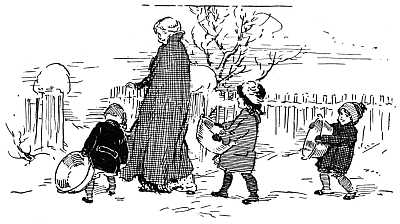
"Peter and Polly," said mother, "should you like to play a new game?"
"Oh, yes, oh, yes! Tell us fast!" cried both children.
"I cannot tell you," said mother. "But I will show you. Get ready to go out of doors. Here comes Tim. That is good. He may play, too."
"How many can be in this game, mother?"
"Ever so many, Polly. Please take this dish pan. Peter, carry this pan. Tim, here is one for you. Now follow me."
Mrs. Howe went through the open gate into the hayfield. A hard crust was on the top of the snow.[112]
"See, children," she said, "what a fine crust. It holds me up. It is just right for sliding. By and by the sun will make it soft."
"I wish we had our sleds," said Peter. "Let's go back for them."
"You have them with you," said mother. "That is the game."
"I don't see any game," said Peter. "And I don't see any sleds."
"Then I will show you, my son. Bring your big pan here. Put it down on the edge of the hill. Now sit in it. Hold on to the handles. Keep your feet up. You need not steer. You can't run into anything here. Now go."
Mother gave Peter a push. Away he went on the icy crust.
"Mother, mother!" cried Polly, jumping up and down. "Look at Peter, look! I want to go! I want to go!"
"In a minute," said mother. "Watch Peter, first."
Peter's dish-pan sled was not like a real sled. It did not go straight. It turned around and around. First Peter slid backward, then sideways. At last he reached the bottom.[113]
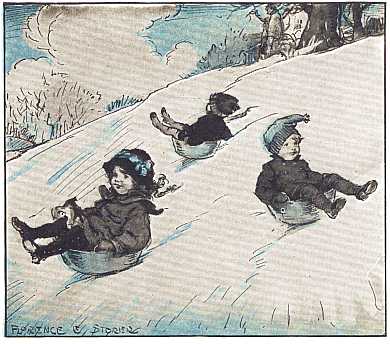
He stood up and looked around. Then he laughed.
"Did you like it, Peter?" called mother.
"I did! I did!" cried Peter. "It felt just like sliding and rolling down hill at the same time. I am going to play this game all the morning. Let's all go now."
"Very well," said mother. "If you bump into one another, it won't hurt you. Get ready."
So the children, in their dish-pan sleds,[114] started down the hill. Polly bumped into Tim. This made him spin around and around. Polly went the rest of the way backward. Near the bottom she fell out.
Just then Wag-wag came running up the field. He was dragging Peter's sled behind him.
He had heard the children and was coming to find them. Perhaps he thought they had forgotten Peter's sled.
"Oh, look, look!" said Polly. "Wag-wag has a sled, too. Let's give him a slide. Come here, Wag-wag. Come here, sir."
But Wag-wag would not come. Instead, he ran up the hill past Mrs. Howe. The children picked up their dish pans and chased him.
"Never mind," said mother. "When he is tired of playing with the sled, he may bring it back. Or you can go after it.
"Now good-by. Slide until the crust is soft. Then come in. Do you like the new game, children?"
"Oh, we do, we do!" they all cried.
"And we like our new sleds, mother. We are going to name them," said Polly.
"I am going to tell my mother not to[115] wash dishes any more. I am going to tell her to give me her dish pan," said Tim.
The children slid for a long time. At last the crust began to be soft. They sank in a little at every step.
"I shall slide once more," Polly said. "Then I shall go home."
"I shall get my sled first," said Peter. "I wish Wag-wag had not left it so far away."
Peter started across the field. Before long, he came to a place where the snow was very soft. He sank into it as far as his legs could go. He could not get to the sled. So he went home feeling quite cross.
Tim's father was in the yard. He had come for Tim. Collie was with him.
Peter said, "Wag-wag is a bad dog. He left my sled out in the field. The snow is soft. I cannot get to it."
Tim said, "My father will send Collie after your sled, Peter. Won't you, father?"
"Oh, will you?" asked Peter. "I shall want to slide in the road after dinner. Dish pans are not good in the road. So I need my sled."
"Why, yes," said Tim's father. "Collie[116] can get it. He will not break through the crust as you do."
He showed Tim's sled to Collie. He put the rope into Collie's mouth. He pointed to the end of the big field. Then he said, "Collie, go bring the sled."
Collie was a wise dog. He understood many things that were said to him. He knew what his master wished him to do now.
He went running over the snow. He found the sled and drew it home.
"Good old Collie," said his master, patting him.
"There," said Tim, "I told you Collie is smarter than Wag-wag. He is, too."
"Maybe he isn't," said Peter. "Maybe Wag-wag was smart to leave my sled there. But anyway I like Collie because he got it for me."
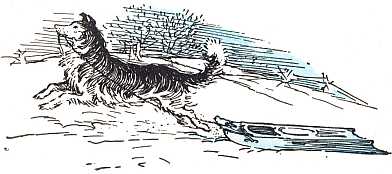

One winter day grandmother had been visiting Mrs. Brown. In the afternoon she started for home. The sun was warm. The snow was packed hard in the road. The walking was good.
Grandmother liked the cold, crisp air. She liked the blue sky, and the hills and fields all white with snow. She liked to hear the chick-a-dees, calling among the trees.
She was halfway home, when she heard a noise behind her. It was, "Meow, meow."
"That sounds like a cat," said grandmother to herself. "But, of course, it is not. No cat would be in these woods in winter."
"Meow, meow," came the sound again.
This time grandmother looked around. What do you think she saw? There, in the road behind her, were two black and white kittens. They were trotting along side by side. They looked just alike.[118]
Grandmother stopped and called, "Kitty, kitty, kitty! Come here, you pretty kitties. Where did you come from? Are you following me?"
As soon as grandmother stopped, the kittens, too, stopped. She went back toward them. When she did this, the kittens turned and ran away. They did not wish to be caught.
Grandmother called to them again. She tried in every way to get near them. But she could not.
At last she said, "Poor kittens! You do not know that I am your friend. I do not like to leave you here in the cold. But I cannot stay any longer. I must go home."
So she walked on up the road. When the kittens saw this, they started after her. She looked back and saw them following. Side by side they came, their little pointed tails straight up.
"Well, I never!" said grandmother to herself. "Now, do you suppose they will follow me home?"
She kept looking back to see. Every time she looked, the kittens were coming. But, if she stopped, they stopped.[119]
Through the village they went. They did not seem afraid. There were no people about. Not a dog was to be seen.
At last they reached grandmother's house.
"Now," said grandmother, "you have followed me to my door. Are you looking for a new home? Did you pick me out to be your mistress? If you really wish to live with me, you may. We shall see."
She unlocked the door and went in. She left the door open. And after her went the two black and white kittens. They ran under the stove at once. Then grandmother shut the door.
In a short time she gave them some warm milk. When they had finished it, they took a walk around the room.
One found grandmother's workbasket. Then he felt sure that he should like his new home. He began to play with the spools.
His brother saw him. He thought he should like a game, too. So he rolled some of the spools out on the floor. But grandmother put the basket away before they did much harm.
Just then the telephone bell rang. The kittens both looked around. One jumped[120] upon the table. From there he jumped to the telephone box.
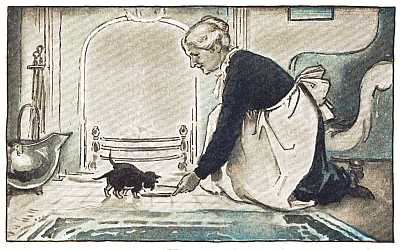
He put his paw on the bell, which kept ringing. Perhaps he thought it would play with him. Perhaps he did not like the noise.
Then one jumped up into grandmother's lap. She patted it; and soon the other came, too.
"You funny kittens," said grandmother. "You are almost alike. You, sir, have a black spot on this leg. You have not. If you are to be my kittens, I must name you.
"You are so nearly alike, I shall call you Cat and Copy-cat. And, if you are good, you shall always live with me.
"Now I will telephone to Peter and Polly about you."

"Peter, I've thought of something. Let's make some snowshoes."
"How do you do it, Polly?"
"I think I know. I saw a pair this morning. They were made of barrel staves. They are not real snowshoes, of course."
"Of course not," said Peter. "Father's snowshoes are not made of barrel staves. Let's go to look at his. Let's make some like them."
"We can't, Peter. But we can make the other kind. Let's see if there is a broken barrel. Then we'll ask mother if we may have four staves."
"My flour barrel is just empty," said mother. "We will roll it outside. I will knock it to pieces. Then you may have your four staves. Please clean them out of doors. If you do not, you will get flour all over the workshop."[122]
When the children took the staves into the workshop, Peter said, "What next?"
"We want four strips of leather next. They are for straps. We will tack one strap on each stave. They will go across the staves. We will tack them at the sides. They must be loose. We shall put our toes under them."
"How will our snowshoes stay on?" asked Peter.
"I'll show you by and by. I must ask mother to cut this leather for me."
When the leather was cut, Polly tacked on the straps. The snowshoes now looked like this:

"I wish to put mine on," said Peter.
So he stuck his toes under the leather straps. He scuffed over the floor. Then he tried to go backward. But he only pulled his feet out of the leather straps.
"They will not stay on. I knew they would not," he said. "I do not like them very well."[123]
"I'm fixing mine so that they will stay on," said Polly. "I will fix yours, too."
To each end of the leather straps Polly had tied a piece of soft rope. Her snowshoes now looked like this:

"Put your toes under the straps, Peter. I will wind the ropes back of your heels. Now they go around your ankles and tie in front. See if the snowshoes will come off now."
Peter scuffed around the room again. The snowshoes held fast. They worked very well when he scuffed. But, if he tried to step, the backs flew up and hit him.
"Father's don't do that," said Peter.
"I know it," said Polly. "There are holes in father's. His toes go down through those holes. You haven't any holes. So your toes push the front of your snowshoes down. Then the backs fly up and hit you. You must scuff, not walk."
"I will," said Peter. "Let's go out of[124] doors and try them. They are good snowshoes now."
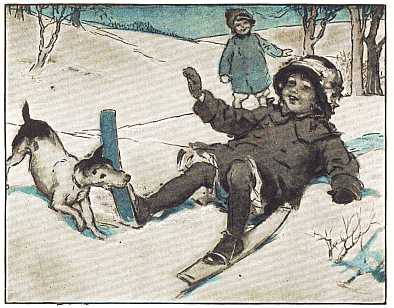
So out the children went. There was a little crust. The children walked on it. Their snowshoes held them up.
They called to mother. She must see them. Mother looked through the window. She clapped her hands.
All went well for a few steps. Then the toe of Polly's snowshoe caught. It cut into the crust.
This pulled Polly forward. She fell on her face. Her arms stuck down into the[125] snow. The points of her snowshoes stuck down into the snow, too. At first Polly could not get up.
Then she rolled over on her side. She was almost on her feet again, when Wag-wag dashed up.
He had seen Polly rolling in the snow. He thought it was a game. He wished to play, too.
He took the end of one snowshoe in his teeth. He pulled and pulled. He shook the snowshoe. Then he jumped around Polly and on her.
Polly was laughing so that she could not scold him. She could only say, "Oh, don't, Wag-wag! Don't!"
Mother and Peter were laughing. And perhaps Wag-wag was laughing, too.
At last he stopped playing. Mother came out of the house. She threw a broom to Polly. Polly helped herself up with this.
She said, "These are good snowshoes. They are best when I am on them. They are not so good when I am down. But I think that I can do better than that next time."

"We are going on a picnic to-day, chicks," said Mr. Howe.
"A picnic, father! I thought picnics were in summer."
"So they are, Polly. But why not have a winter picnic, too? I am going into the woods. You may come, if you wish."
"But at picnics we have things to eat. We eat out of doors."
"We shall have things to eat to-day. And we shall eat out of doors, too."
"But, father, we shall be cold!"
"What keeps us warm in the house in winter, Polly?"
"A fire," said Polly. "Oh, now I know, now I know! You will build a fire in the woods. Once you promised me that you would. Goody, goody, goody, goody!" And Polly jumped up and down for joy.
"What shall we eat?" asked Peter. "Just bread and butter?"[127]
"Oh, no," said father. "We shall have bread and butter, of course. But we shall have other things, too. We will cook our dinner."
"Oh, oh, oh!" cried both children.
"Are you glad? I thought you would like it. Now help me get ready. Please get my knapsack, Polly."
In the kitchen, mother was busy spreading bread. She wrapped paper around the slices. She put coffee into a small, cheese-cloth bag. She filled a flat bottle with milk.
Father took six eggs. He rolled them up in paper. He put a jar of bacon into his knapsack. Then the bread, coffee, and eggs were fitted in. The bottle of milk went into his pocket.
"We will take my camp dishes," he said. "I will fasten my hatchet to my belt. Get on your things, and we are ready."
"Let's play that we are Indians," said Polly. "Where are we going, father?"
"Up the wood road on the hill. I must see if all our wood has been cut. We need a little for our furnace, a little for our stove, and a great deal for our fireplaces.[128]
"Let's all keep our eyes wide open to-day. We may see interesting things."
"I think that cooking our dinner will be interesting, father. I almost wish it were dinner time now."
"We will build our fire where our trees have been cut. There we shall find plenty of firewood," said father.

"See those tracks in the snow, children. A rabbit has been here. Yes, this hollow is where he lies. The snow is packed hard. It is a little dirty, too. Perhaps he is near by, watching us."
"Poor rabbit," said Polly. "What a cold bed. The Eskimos have snow beds. But they have fur rugs to cover the snow."
"The rabbit has one between him and the[129] snow, too. Only his rug is on his back. It keeps him warm," said father.
"Look, look!" cried Polly. "Over there by those trees!"
"That's surely a rabbit, Polly. See him jump along. He is nearly as white as the snow. He did not wait for us to call, did he?"
"What big jumps," said Polly. "I think he could beat Wag-wag."
"I am sure that he could, Polly. His hind legs are very long. They are made for jumping. He can take twice as big jumps as he is taking now. But he will not, unless we frighten him."
"Why doesn't he go into a hole in the winter? Why doesn't he sleep until spring comes? The woodchuck does. Why doesn't he?" asked Polly.
"He is not made so that he can. Some animals store up fat on themselves. In the winter they go to sleep.
"Then they seem to live on that fat. For, in the spring, they are always thin and hungry looking.
"You couldn't do that, you know. And the rabbit cannot do it. What are those birds, Peter?"[130]
"Chickadees," said Peter. "I always know them. They cannot fool me. They never say anything but 'chick-a-dee.'"
"Oh, yes, they do, my son. Listen! What is that? There it is again."
"Some one is whistling," said Polly. "Isn't it a pretty whistle?"
"It is just two notes," said father. "Aren't they sweet and clear?"
"It is quite near. But I cannot see any one. Are you doing it, father?" asked Polly. "Why, now I can hear three people."
"Look above you, Polly. You will see who is whistling."
Polly looked. There on a limb of a tree was a chick-a-dee. He was singing those two notes. In the next tree another was singing two other notes.

"So you see, Peter, that they do say something besides 'chick-a-dee.' These two notes are their song. The other is just their talk. Perhaps you can learn to whistle those notes.
"Here is the place where our wood has been cut. Let us look at it."

"Yes," said father, "we shall have plenty of wood. See, this wood with rough bark is maple. This, with smooth bark and lighter spots, is beech. We will not use it in our fireplaces. It might snap sparks out on the floor.
"And here is some beautiful white birch. This is for our fireplaces. Here is yellow birch, too. Yes, there is plenty for next winter."
"If we were really Indians, we could make canoes out of the white birch bark," said Polly.
"Isn't it nice here? The trees are thick all about us. How still it is!"
"It is still in the woods in winter," said father. "I always like it."
"I think it is too bad to cut the trees down, father. Will they grow again?"
"See, Polly," said father. "We have[132] cut down only the largest trees. They were as large as they would ever be. Now the smaller ones will have a better chance to grow.
"I would not cut them all down, unless I planted more. It would not be good for my land to do that.
"This is the spot for our fire. Let us make it now."
He found a place, near a log, where the snow was not deep. He cleared most of it away. There he built the fire. He used pieces of birch bark instead of paper. Small twigs made very good kindling wood.
Peter and Polly pulled birch bark from the logs. They broke up the dry twigs.
With his hatchet, father cut sticks of wood. He laid some of these on the fire. He stuck his kettle irons down into the snow. They looked like this:
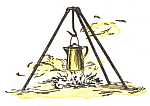
Then he lighted the fire.
He filled the coffeepot with snow. He hung it on the hook of the kettle irons. It was quite near the blaze. When the snow had melted, more was put in.
Father said, "It takes much snow to[133] make a coffeepot full of water. When the water boils, we will put in the bag of coffee."
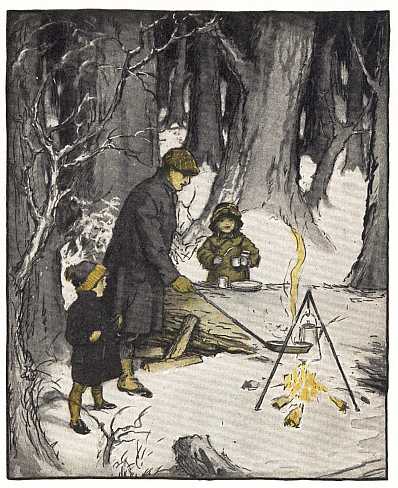
Polly had taken out the camp dishes. She said, "We must have three plates, three cups, three knives and forks and spoons. I will[134] put them on this log. I will put the bread and butter on the log, too."
Father had cut a straight stick. It looked like a cane. He took out the frying pan.
"This stick is my handle," said he. "See where it fits in. Now I shall not need to stand too near the fire. Frying would be hot work, if I had not a long handle. Give me the bacon, Peter."
Soon the bacon was cooking nicely. How good it smelled! Then the eggs were dropped into the pan.
When they were fried, father said, "Dinner is ready. Bring your cups. You are to have a little coffee. It will be mostly milk."
This was a great treat. Peter and Polly did not drink coffee at home. Then father gave them their bacon and eggs.
"Why," said father, "I forgot the sugar for our coffee."
"Mother did not," said Polly. "I saw her put it in, and here it is."
How good everything tasted! They sat on the log near the fire to eat. So they were quite warm.
"This is the best dinner I ever had,"[135] said Polly. "Who taught you to cook, father? I forgot all about playing Indians, I have been so busy."
When dinner was over, father picked up the dishes. He wiped them with paper napkins. He put them into their case. Mother would wash them at home.
The fire burned low. He threw some snow on it. This made it safe to leave.
"Now I will show you some tracks," said he. "They were made by the white-footed mouse. See how small they are. That line in the snow is where he dragged his tail.
"He must have gone up into this tree. But I cannot see him anywhere. Perhaps he lives in that old nest up there. He may have watched us eat our dinner."
"Good-by, Mr. White-foot," called Polly. "We are sorry not to see you. We are going home now."
Down the hill through the quiet woods they went. Polly had the big knapsack over her shoulder. It was quite empty now, and not at all heavy. Peter ran ahead.
At the door, Polly said, "Thank you, father, for our good time. It is the best picnic that I ever had."

"Mother," said Polly one day, "I wish I could sew something real. I am tired of my patchwork. I wish I could make a dress for my doll. She needs a new dress."
"Then you shall try it, Polly. Go to the drawer in the sewing table. You will find a pattern at the back of the drawer. It is for you."
"O mother!" said Polly. "How did you think of it?"
"I knew you would need it soon. Here is the cloth for the dress."
She gave Polly some pretty blue cloth. She said, "Spread it out on the table. Pin the pattern smoothly to the cloth. Be sure to pin it straight. Now cut around the edge."
Polly worked very carefully. At last she said, "See, mother, this is what I have left. There was too much."[137]
Just then Peter came into the room. "What are you doing?" he asked.
"I am cutting out a doll's dress. See my pattern. See my pretty cloth."
"What is this piece for?" asked Peter.
"Nothing," said Polly. "That is left over. I do not need it at all."
"I wish I could have it," said Peter. "I wish I could sew something, too."
"You may have it," said mother. "You may sew something. What do you wish to sew?"
"Let me see, mother. I think I will make me some clothes."
"There is not quite cloth enough for that, Peter. Besides, it would be hard to do. Why not make a bean bag?"
"That would be good," said Peter. "Where are the beans?"
"You shall have them when the bag is finished," said mother.
"But I must have them now. I must sew around them, mustn't I?"
"No, dear. This is the way we do it. First we cut it right. Then we turn the edges. Then we baste them together.
"Here is a little thimble. Here is a large[138] needle. Begin at this corner. Make your stitches as small as you can.
"If they are too far apart, your beans will fall out, by and by. How are you getting on, Polly?"
"I have some of the pieces basted together. May I stop basting and sew a little?"
"If you like. Aren't you glad now that you can sew over and over so nicely?"
Peter and Polly did not finish their work that day. But at last the bean bag was done. Then Peter took it to Tim's house. He wished to show Tim what he had made.
At last the dress, too, was finished. How pleased Polly was! She put it on her doll at once.
She said, "Now I will take her calling. I will show her to the other children. They will all wish to make dresses."
"If they do, we will cut the patterns for them," said mother. "Perhaps we can have a little sewing school. I will be the teacher, and you may be my helper. Should you like that?"
"Oh, I should, I should, mother. You do think of nice things. I will go this minute and tell the other girls."
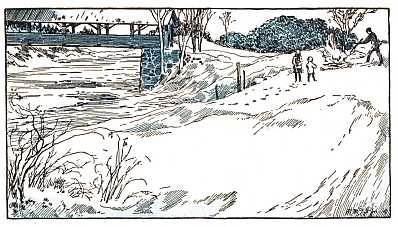
"I wish I could go fishing," said Peter.
"You'll have to wait until summer," said Polly.
"Then I wish it were summer now."
"Why, Peter Howe! When it was summer, you wished for winter. Now it is winter, you would like it to be summer."
"Yes," said Peter. "You see, when I wished for winter, I forgot all about fishing. Anyway it will be summer soon."
"Not very soon," said Polly. "Will it, mother?"
"I will take you fishing," said father.
"How can you?" cried Peter. "Can you make it summer?"
"No, but I can take you fishing just the[140] same. Get ready and we will go. Polly may come, too, if she likes."
"Oh, oh, oh!" shouted Peter. "Where is my fish pole, mother?"
"You will not need it, Peter," said father. "We shall need just our lines, hooks, sinkers, and bait.
"Put an extra pair of mittens in your pocket. You might take the red ones that the snow man liked so well."
They walked up the road. By and by they came to a bridge. At one end they climbed down to the river.
Here they found a path. It took them on to the river. At the end of the path the snow was trodden down. Peter saw two holes in the ice.
"Father," he said, "see those holes. Who made them?"
"The blacksmith and his boy chopped them yesterday. Then they fished through them. You see now why the blacksmith did not shoe Brownie yesterday.
"He knew you would be sorry about that. So he told me to bring you fishing."
"I'd rather do this than anything else," said Peter. "I will thank him for his holes."[141]
"You will not like to do it long," said father. "It is a cold day."
He baited Polly's hook and Peter's hook. He showed them how far into the water to put their lines.
Then he said, "While you are fishing, I will build a little fire. There are plenty of small pieces of wood by the bank. You may warm your fingers at my fire. Perhaps the fish will not bite to-day."
"Did the blacksmith catch any?" asked Polly. "Oh, yes," said father.
"Maybe he caught them all," said Polly. "I haven't had a bite yet. I am getting cold standing here."
"Then come and warm your fingers at my fire," said father.
Just then Peter said, "I feel something!" And he began to pull up his line.
As soon as he pulled, Polly cried, "Oh, I feel something, too. It's a bite, a bite!" And she began to pull up her line.
All at once they both stopped pulling.
"I'm caught," said Polly.
"I'm caught," said Peter. "It won't come any farther. But it jerks. Maybe it isn't caught. Maybe it's a big fish."[142]
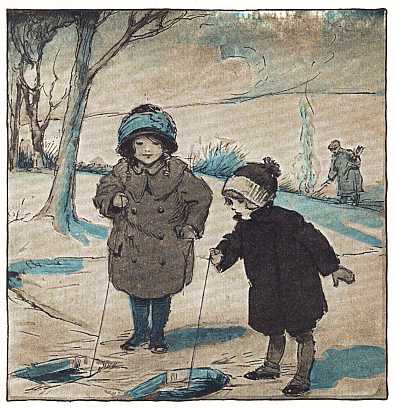
Father began to laugh. "I think your big fish is Polly," he said. "Let me see."
He took Peter's line. He told Polly to let hers out slowly. Then he pulled. Surely enough, Peter's hook came up through his hole. Polly's hook came up, too.
Peter and Polly had caught each other! How they laughed at this!
Peter said, "I shall carry my big fish[143] home to mother. She will like it. But she will not cook it. Let us go now to tell her."
"Very well," said father. "Roll up your line. Then warm your hands before we start."
Polly had dropped her hook back into the water. All in a minute she felt a good bite.
"Oh, I have one, I have one!" she cried.
"Pull in!" said father.
Polly pulled. Up through the hole came a beautiful big trout.
"Well, well, well!" said father. "Isn't that a beauty? I wonder how it happened to bite our pork. We must throw it back. It's too bad."
"O father, my fish!" cried Polly. "Why did you? Wasn't it a good fish?"
"Indeed it was, Polly. But back it had to go. We can't keep trout in the winter."
"Then let's go home now," said Polly. "I might catch more. And I should not like to throw them back."
"I'm all ready," said Peter. "I think we have had a good time. You caught a big fish and I caught a big fish and we can't eat either of them."
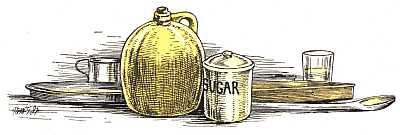
It was a wet, rainy day. Peter and Polly had been out in the rain. It did not hurt them.
They had on rubber boots, rubber coats, and rubber caps. Peter's rubber coat was yellow. Polly's was black. They played that they were firemen.
In the afternoon, mother wished them to stay in the house.
She said, "The rain makes the snow wet. It is not nice to play in. We will have a candy party. We will make molasses candy. You may each pull some."
"I should rather do that than play out of doors," said Polly.
"So should I," said Peter.
"Very well, children. Put on your aprons. Now, Polly, get the molasses jug."
Mother measured out the molasses. Then she put it on the stove to boil. Soon she[145] measured out some white sugar. She poured it into the molasses.
"Peter, you may carry away the sugar. That is the way you helped grandmother, you know."
"Now let me stir," said Polly.
"Oh, no," said mother. "We do not stir this candy. I thought you knew better than that."
Soon the molasses boiled. The children liked to watch it. They liked the good smell.
Peter said, "See it bubble up just like our spring."
"It is the steam, trying to get out, that makes the bubbles," said mother. "You know that steam is strong. You have seen it lift the lid of the teakettle.
"Now let us try the candy. Bring a cup, Polly. Bring a cup, Peter. Fill them half full of cold water."
Mother dipped a spoon into the boiling candy. She poured part of the spoonful into Polly's cup, and the rest into Peter's cup.
"Let it stand a minute. Then we will see if the candy is hard enough to pull. After that you may eat it."[146]

This was just what the children wished to do. They were glad because mother had to try the candy again.
At last, it was poured into cake tins. It was set out of doors to cool. There was a big tin for mother, a little tin for Polly, and a little tin for Peter.
Peter and Polly could hardly wait for the candy to cool. They were in such a hurry to begin pulling it. Polly stuck her finger into hers before it was ready. It almost burned her.
A few minutes after this, mother said, "Yours is cool enough now. Mine is not. Wash your hands again. Then you may begin."[147]
What a sticky time there was!
Polly pulled her piece over and over quite well. Soon it began to grow light colored. When it stuck to her hands, she ran out of doors. This cooled the candy.
But Peter could not pull so fast. His piece stuck to both hands. It got between his fingers. Mother scraped it off and he began again.
At last, he dropped part of it on the floor. Mother said, "Let it alone, Peter. I will scrape it up. It is not good to put with yours now."
Peter said, "I guess I do not like to pull candy. I am going to make fly paper of mine. It is sticky enough."
"Yes," said mother. "It is sticky. But you are doing very well."
"Mine is ready to cut up, I think," said Polly.
She laid it on the clean kitchen table. She pulled it out into a long, thin strip. Then she took a pair of clean scissors. She cut the strip into short pieces.
"That is just the way," said mother. "Put it on the buttered plate. You are a good candy maker. Grandmother must[148] [149]have some of this. O Peter! What are you doing?"
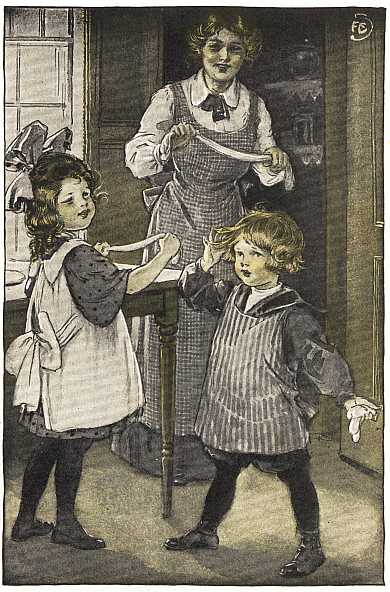
Poor Peter had somehow got his hand stuck to his hair.
"I am just trying to get my hand away," said Peter. "But it is stuck."
"I should think it is," said mother. "You must sit quite still until I get my candy ready to cut. Then I will help you."
"O Peter! How funny you look!" laughed Polly. And indeed he did look funny, with his hand held close to his hair.
"But I don't feel funny, Polly. You stop laughing at me."
Mother gently pulled his hair away from the candy. Then she scraped his hands.
"Please save my candy, mother," said Peter.
"I cannot, Peter. It is not clean now."
And Polly said, "You may have mine, Peter. I am sorry I laughed."
Then mother washed Peter's hands. "I must wash your hair, too," she said. "But never mind. It needed washing. You have had fun with your candy, haven't you?"
Peter answered, "Yes, I have, mother. But please do not make it so sticky next time."

"Here is grandmother. Light the fire, Peter. Light the fire, Polly."
Peter and Polly each took a match. Peter lighted the open fire at the left. Polly lighted it at the right side.
Soon the kindling wood began to crackle. Then the flames leaped high in the fireplace.
Grandmother had come over to supper. She was to spend the evening. It was her birthday. Peter and Polly were to stay up later because of this.
The Story Lady was coming to supper, too. Perhaps, just perhaps, she would tell them a story. She knew stories about everything.[151]
"Here she is now," cried Polly. And the Story Lady walked in at the door with grandmother.
Soon supper was ready. Polly had helped mother set the table. She thought that it looked very pretty.
Grandmother's birthday cake was in the center. On it were a dozen small, colored candles. Polly had helped to put them there.
When mother had shown her the candles, she had said, "Why, mother, grandmother is more than twelve years old.
"She must have a candle for every year. That is what I have."
"I know you do, Polly," mother had said. "But grandmother is sixty years old. We cannot put sixty candles on this cake. It is not large enough.
"So we will count the fives in sixty. Then we will use one for every five years. That makes just twelve."
"Yes," Polly had answered, "I have learned that. Twelve fives make sixty. It is a good way to do. I shall do it when I am sixty years old."
Now the cake was on the table. Just[152] before it was time to cut it, father lighted the candles.
They all watched them burn for a few minutes. The melted wax ran down the sides. They grew shorter and shorter.
"See Nan Etticoat," said Polly. "The longer she stands, the shorter she grows. Do you know that story, grandmother?"
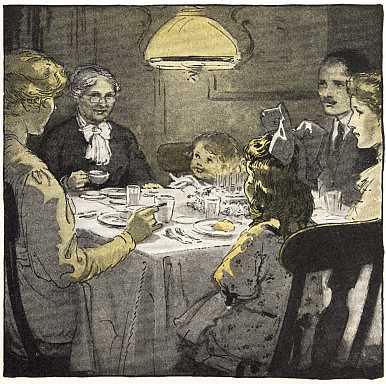
"My grandmother taught me to say Nan Etticoat," said grandmother. "That was[153] many years ago. She told me about making candles, too.
"When she was a little girl, there were no electric lights. There were no gas lights. There were no lamps. Every one used candles.
"Not such pretty, colored ones as these. They were larger and quite rough. How should you like to make them, Polly?"
"Oh, I should like to," said Polly. "May we?"
"Perhaps not," said grandmother. "We do not need to do so. We have other lights.
"But in those old days, people made their own candles. They called it 'dipping candles.' It was a hard task.
"I am sure that they did not light many at once. I am sure that my grandmother did not have candles on her birthday cakes.
"Now, my son, the wax is dripping on the frosting. The candles are nearly burned. If you will put them out, I will cut my birthday cake."
Mr. Howe pinched the lighted ends in his fingers. He did this very quickly.[154]
"Don't they burn your fingers, father?" asked Polly.
"No, indeed, Polly. I do not give them time to burn me. This is better than to blow them out. Then there is smoke. But children must not do it this way."
Grandmother took the knife and cut the cake. She cut it as a pie is cut. Each one had a very fat piece.
"Now we shall see if this cake is as good as it looks," said grandmother. "I am sure that it is, for your mother is a good cook, Polly."
But Polly was not listening. She was looking at something that she had found in her cake.
She poked it with her fork. Then she took it up in her fingers.
"Why, mother," she said, "what a queer thing there is in my cake. How did it get there?"
Just then Peter said, "There is a lump in my piece, too. It is something hard."
Father said, "Clean the cake from your lumps and see what they are. Why, I have a lump myself."
"And so have I," said the Story Lady.
"And so have I," said mother.[155]
"Then," said grandmother, "I am the only one who has no lump. How did you let these lumps fall into your cake, daughter? Can I ever again call you a good cook?" And she laughed at Mrs. Howe.
Just then her fork struck something.
"Dear me!" cried grandmother. "A
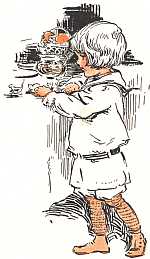 lump in my piece,
too! Now I think
they must have
been put in the
cake on purpose."
lump in my piece,
too! Now I think
they must have
been put in the
cake on purpose."
"Oh, see, see, grandmother! See what mine is!" And Polly held up a little, white china pig.
"Look at mine!" shouted Peter. He had scraped the cake from his lump. In his hand was a small, white china monkey.
"What is yours, Story Lady? And yours, mother? And yours, father?" asked Polly.[156]
"Mine is a cat," said the Story Lady.
"And here is a kitten to go with her," said mother.
"And here is a naughty dog, to chase your cat and kitten," said father. "Let's put them in a row on the table. Then we can all see them."
"But where is your lump, grandmother?" asked Polly.
Grandmother held out her hand. On it, there lay a beautiful, gold thimble.
"Oh! Oh! Isn't it pretty!" cried Polly. "Who gave it to you?"
"Indeed it is, Polly. I think I know who gave it to me. It was you, my daughter. You knew that I had lost mine.
"I thank you for this. And I thank you for another happy birthday party. Perhaps you may put lumps in your cakes, just on birthdays."
"I will not do it at other times," said mother. "Now let us all go into the other room and sit before the open fire."
"When our bedtime comes we need not go, need we, mother?" asked Polly.
"Not to-night, Polly. You and Peter may sit up a while," said mother.
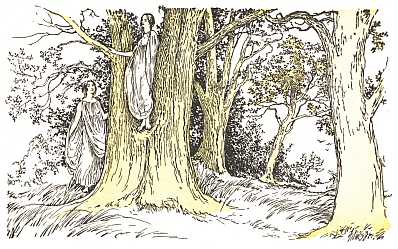
The open fire was blazing well. "Let me draw the chairs about it," said father. "Then we can all enjoy it."
"We do not need chairs, father," said Polly. "Peter and I will sit on the floor. I will sit next to grandmother."
"I will sit next to mother," said Peter.
"When I was little," said grandmother, "I liked to sit on the floor. I thought it quite soft enough. Now that I am older, I like chairs better."
"If you sit in a chair, it is never in the right place," said Polly. "A floor is always in the right place. It is a big seat, too."
"What a good fireplace this is," said the[158] Story Lady. "It is so large that you can put real logs into it. And it never smokes."
"Just think of long ago, when there were no stoves," said grandmother. "How would it seem now to heat our houses with open fires?"
"Why weren't there any stoves, grandmother? And where were the furnaces?"
"People did not know how to make stoves and furnaces, Peter. They had very large fireplaces, instead. My grandmother told me about them."
"What beautiful white birch logs," said the Story Lady. "They make such a good fire."
"They came from our woods," said Peter. "We were up there one day. We went to see next winter's wood. There is plenty. Some is already cut and piled."
"At first, I did not like to see the pretty trees cut down," said Polly. "But father told me that it is sometimes best."
"So it is, Polly," said the Story Lady. "We need the wood to keep us warm, and for many other things, too. What are some of them?"
"Carts, sleds, telephone poles!" shouted Peter.[159]
"Houses, barns, bridges!" shouted Polly.
"Yes, indeed, children, for all those and more. So we must cut down some of the trees. But we must take care that others grow in their places.
"Thousands of years ago, people believed strange things about trees. They believed that in some lived beings called dryads.
"These dryads were like lovely maidens. A maiden is a girl, you know. They could come out of their trees. But still they were a part of the tree.
"If a tree was cut down, the lovely dryad who lived in it died. So, in those days, most people did not wish to cut down trees. They were afraid of hurting the dryads.
"When trees grew old and fell, the dryads died, too. Sometimes kind people propped up old trees. Then the dryads could live a little longer."
"Oh, I wish I could see one," said Polly. "What did they wear?"
"No one knows exactly, Polly, because no one ever saw a dryad. It is one of those stories that have come to us from thousands of years ago.[160]
"Most of the stories are not true. We call them myths. And we like them very much."
"Are myths as good as 'Once upon a time' stories?" asked Peter.
"Yes, indeed, Peter. Get your mother to tell you some, and see."
"Now I shall think of this story, when I see our fire burning a dryad's house," said Polly.
"I shall play that there are dryads in our trees, too. Perhaps, if I play hard enough, one will really be there.
"When spring comes, I shall go to the woods often. I know where there is a hollow tree. That will make a good dryad's house."
"Spring is coming soon," said mother. "The cold winter is nearly over. But, first of all, bedtime is coming. It has nearly come, now. Say good night, Peter and Polly. Then off with you."
So Peter and Polly said good night and went upstairs to bed. Perhaps they dreamed of dryads. Perhaps they dreamed of spring-time. Perhaps they slept soundly and did not dream at all.